

10 Lines on Mahatma Gandhi
Mahatma Gandhi was the greatest leader of his time and millions of people used to respect and follow him. He completely changed his attire and wore a simple loincloth, which, he thought, would let him connect to the Indian poor. He took an active part in the Indian Independence Movement and led India to the path of Independence through truth and righteousness.
Ten Lines on Mahatma Gandhi in English
I have provided here 10 lines, 5 lines, 20 lines, a few lines, and sentences on Mahatma Gandhi for my dear children and students of Classes 1, 2, 3, 4, 5, and 6. Just go through these lines to find the best one for you:
1) Mahatma Gandhi had born in a Hindu family on 2nd October 1869 at Porbandar in Gujarat.
2) His father Karamchand Uttamchand Gandhi was Diwan of Porbandar.
3) Mahatma Gandhi married Kasturbai Makhanji Kapadia in May 1883.
4) On 4th September 1888, he left for London for higher studies.
5) He was a civil right activist in South Africa from 1893 to 1914, fighting against color discrimination.
6) He returned to India in 1915 and joined the Indian National Congress.
7) Gandhi ji started the first movement against British rule, Champaran Satyagraha in 1917.
8) He launched the non-cooperation movement on 01 August 1920 after Jallianwala Bagh Massacre.
9) He started Salt/Dandi March on 12th March 1930 and continued till 06th April 1930.
10) Nathuram Godse, a right-wing advocate of Hindu Nationalism, assassinated Gandhi on 30th January 1948 at Birla House, New Delhi.
10 Lines and Sentences on Mahatma Gandhi
1) Mahatma Gandhi was the leader of the Indian Independence Movement against British rule.
2) He inspired civil rights and freedom movements across the world.
3) The title “Mahatma” was given to him in South Africa in 1914.
4) In India, Mahatma Gandhi was fondly called Bapu and Gandhi Ji.
5) Mahatma Gandhi belonged to a merchant caste family from coastal Gujarat in India.
6) He returned to India in 1915 and started mobilizing farmers against excessive taxes.
7) He was imprisoned on several occasions for many years in South Africa and India.
8) Mahatma Gandhi wore simple yarn clothes woven with yarn hand-spun on a charkha.
9) He was strict a vegetarian and undertook fasts for protests and self-purification.
10) Mahatma Gandhi undertook his last fast on 12th January 1948 at the age of 78.
5 Lines on Mahatma Gandhi
1) Mahatma Gandhi was a great Indian freedom fighter.
2) He started many freedom movements in India.
3) He was a supporter of Ahinsa (non-violence).
4) He is also renowned as the “Father of the Nation”.
5) Today also, people follow his teachings and beliefs.
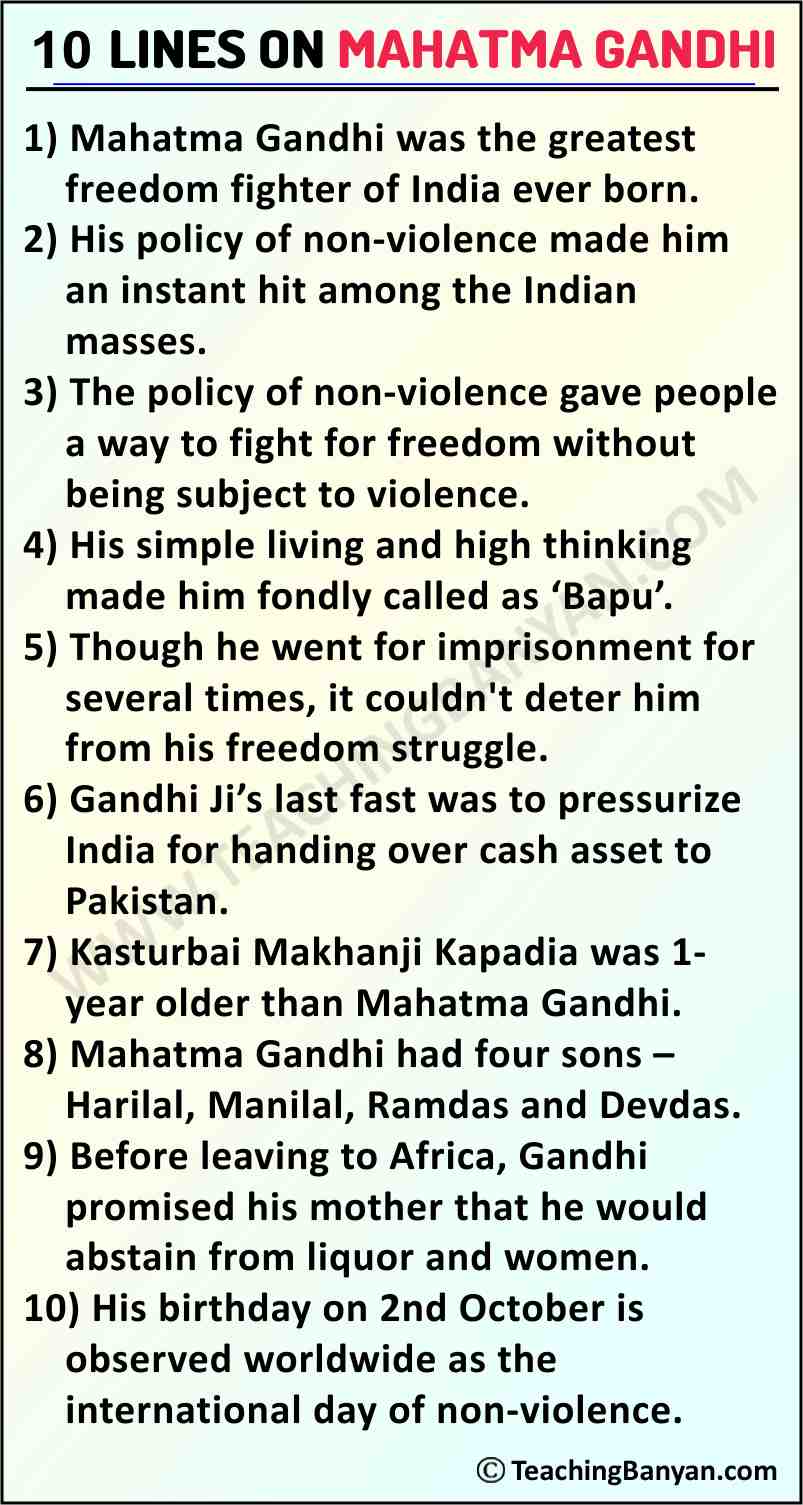
20 Lines on Mahatma Gandhi
1) He was a great follower of truth and non-violence and supported them throughout his life.
2) Mohandas Karamchand Gandhi was an Indian lawyer, active politician, and freedom fighter.
3) The main campaign run by Gandhi Ji during freedom struggles are Champaran Satyagraha, Kheda Satyagraha, Non-cooperation Movement, Salt Satyagraha, etc.
4) Gandhi Ji pursued his degree in law from London University.
5) Mahatma Gandhi joined the Indian National Congress in 1920.
6) Despite being nominated 5 times, Gandhi Ji had never won the Nobel (Peace) Prize.
7) Gandhi Ji was the winner of the ‘ Time Magazine of the Year ’ award in 1930.
8) Gandhi Ji had died at Gandhi Smriti formerly known as Birla House.
9) India celebrates his birthday as the Gandhi Jayanti every year.
10) The Indian Government has declared 30 January as Martyrs’ Day.
11) Mahatma Gandhi was the greatest freedom fighter of India ever born.
12) His policy of non-violence made him an instant hit among the Indian masses.
13) The policy of non-violence gave people a way to fight for freedom without being subject to violence.
14) His simple living and high thinking made him fondly called Bapu.
15) Though he went to imprisonment several times, it couldn’t deter him from his freedom struggle.
16) Gandhi Ji’s last fast was to pressurize India for handing over cash assets to Pakistan.
17) Kasturbai Makhanji Kapadia was 1-year older than Mahatma Gandhi.
18) Mahatma Gandhi had four sons – Harilal, Manilal, Ramdas, and Devdas.
19) Before leaving for Africa, Gandhi promised his mother that he would abstain from liquor and women.
20) His birthday on 2nd October is observed worldwide as the international day of non-violence.
Mahatma Gandhi had shown the path to millions towards independence and self-rule using policies of non-violence and civil disobedience. He was the greatest freedom fighter who proved to the world that the greatest of battles could be fought and won by applying peaceful methods. We all must take active participation in celebrating Gandhi Jayanti, commemorating the birth of India’s Greatest Leader and freedom fighter, and must remember his teachings and beliefs.
Related Information:
10 Lines on Gandhi Jayanti
10 Lines on Mahatma Gandhi’s Educational Philosophy
Related Posts
10 lines on patriotism, 10 lines on nationalism, 10 lines on national flag of india, 10 lines on importance of national flag, 10 lines on importance of national festivals of india, 10 lines on national festivals of india, 10 lines on national festivals celebration, 10 lines on a.p.j. abdul kalam, 10 lines on organ donation, leave a comment cancel reply.
Your email address will not be published. Required fields are marked *
- Growth & Development
- Play & Activities
- Life Skills
- Play & Learning
- Learning & Education
- Rhymes & Songs
- Preschool Locator

Essay on Mahatma Gandhi In English for Students and Children
Key Points To Remember When Writing An Essay On Mahatma Gandhi
10 lines on mahatma gandhi in english, paragraph on mahatma gandhi, short essay on mahatma gandhi in english, long essay on mahatma gandhi in english, major movements of mahatma gandhi, what will your child learn from an essay on mahatma gandhi, interesting facts about mahatma gandhi for kids.
Mahatma Gandhi is a popular historical figure. He is known as the father of our nation and is well-regarded by all the citizens of the country and people worldwide. Most Indian children are familiar with Gandhiji and learn about his contribution to the Indian freedom struggle in school. Students may be asked to write an essay on Gandhiji as a class exercise or for a test or competition. For this assignment, they will need to learn and remember facts about his life and how he fought for India’s independence. This may sound challenging for some children, but with guidance, they will be able to write this essay on their own. Here is an essay on Mahatma Gandhi for classes 1, 2 and 3 that will help school children with their assignments.
Writing an essay includes preparation and strategies. To begin with an essay, we need to understand the topic of the essay. When we are aware of the topic of the essay, we can write the essay easily. Whether you are planning to write a small essay, a long essay, or just a few lines about Mahatma Gandhi, gathering information firsthand will help you a lot. You begin your essay by giving an introduction of Mahatma Gandhi, his place of birth, his life and about his personal life. Next, you can talk about his professional life, his studies and achievements, and what contributions he made to the nation’s independence. Finally, you can conclude the essay with how his life teachings inspire today’s generations and how you can still use those teachings in today’s life and influence others.
The essay about Mahatma Gandhi is slightly different from essays on general topics. For these kinds of topics, children need to remember accurate facts and weave a good narrative. If you are looking for good facts and figures in the form of some lines on Mahatma Gandhi, then the following is for you. Here are some important points to remember:
Before starting the essay, it is important to remember facts such as names, places, events and dates accurately.
For short essays, stick to facts about Gandhi and do not dive deep into any specific topics.
For longer essays, start the introduction about the importance of the man in Indian history.
Talk about his early life and work and transition to the ideology of Gandhiji.
Finally, end the essay with his impact on the nation and how he inspired people.
Children of lower primary classes may be asked to write a short essay on Mahatma Gandhi. They can start by jotting down the facts they remember about him and writing them in simple sentences. Students will have to memorise a few dates and facts to be able to write this essay. Below are the top ten factual lines about Mahatma Gandhi that will help you write a perfect essay on Gandhiji, the national personality:
Mahatma Gandhi is well-known as a freedom fighter and the father of our nation. He is popularly called Bapu.
He was born in Porbandar, Gujarat on October 2, 1869.
His father’s name was Karamchand Gandhi, and his mother’s name was Putlibai Gandhi.
Gandhiji was married to Kasturba Kapadia.
He went to London to pursue his higher education.
He worked in South Africa as a civil rights activist and fought against racial discrimination.
In 1915 he started the Indian National Congress party.
Gandhiji was a firm believer in ahimsa , which means non-violence, and followed the path of satya vachan, which means being truthful.
As a leader of the freedom struggle, he began his first anti-British movement in 1917.
He was shot to death on January 30, 1948.
Before we begin with an essay in 100 or 200 words, we should first practice with paragraph writing. This is why we bring you a short paragraph on Mahatma Gandhi. Let’s look at the paragraph on this national personality.
Mahatma Gandhi, born on October 2, 1869, in Porbandar, India, is one of India’s most iconic historical figures. He has several monikers, such as ‘the Father of the Nation’, ‘Bapu’ , ‘Mahatma’, ‘Rashtrapita’ , and many more. Gandhiji is popular for his non-violence (Ahimsa) and civil disobedience philosophy. He is also known for his simplicity, truthfulness, and dedication to social justice. Lakhs of people joined Mahatma Gandhi in his journey to free India from the colonial rule. He and his supporters organised movements like the Dandi March (Salt March) and the Quit India Movement, which eventually led to India’s independence in 1947. He was assassinated on January 30, 1948, but his principles and message endure as a beacon of hope and unity.
When asked to write a short essay on Mahatma Gandhi, students can list the highlights they remember about Gandhiji’s life and weave them into a paragraph. Here is a sample essay on Mahatma Gandhi in 200 words:
Mohandas Karamchand Gandhi is the most popular historical figure in the nation. He was born in Porbandar, Gujarat, on October 2, 1869. His family was affluent, and he had a good reputation as a quiet-natured boy. He went to London for his higher education, where he studied law and became a Barrister. He practised law at the Bombay High Court upon his return to India.
Gandhiji later moved to South Africa to work but soon lost interest in law. Instead, he joined hands with the natives there to start satyagraha – a non-violent protest against the oppression of the Europeans. He soon returned to India and joined the struggle for independence from British rule.
He was a simple man who taught simplicity and self-reliance to the people in India. He encouraged them to boycott foreign goods and make their own swadeshi goods. He was loved and respected by people of all communities.
As a freedom fighter, Gandhi was a man of firm conviction. During his freedom struggle, the British had put him in jail several times, where he endured extreme hardships. To honour his role in the freedom struggle, his birthday is observed as a national holiday to pay homage to him and all others who stood with him.
A long essay on Gandhi requires students to know and remember several details on his life and write them with a good narrative. Writing a Mahatma Gandhi essay in English in 500 words and more is not a difficult task. Here is a sample essay for class 3 students on Mahatma Gandhi:
Mohandas Karamchand Gandhi, also called Mahatma Gandhi, is the father of our nation. He was a freedom fighter, national leader, and social reformer who worked tirelessly to make India independent. Famous poet Rabindranath Tagore gave him the title of Mahatma. In Sanskrit, ‘Mahatma’ means ‘Great Soul’. He was given this name for his non-violent approach to the freedom movement, contributions to social reform, and convictions to lead a simple life. Since his time, Gandhiji and his philosophy have inspired all social reform movements.
Birth And Childhood
Mahatma Gandhi, aka Mohandas Karamchand Gandhi, was born on 2 October 1869 in the small town of Porbandar, Gujarat. His father, Karamchand Uttamchand Gandhi, was the Diwan of Porbandar and Rajkot and also a court official in Porbandar. Born to a religious woman, Putlibai Gandhi, Mahatma Gandhi became one of the top representatives in India’s struggle for independence from British colonial rule, known for his philosophy of non-violence (Ahimsa) and civil disobedience.
Marriage And Education
Gandhiji was raised with simplicity, although he was from an affluent family. He was a firm believer in non-violence, which was reflected in his approach to anything he did. Gandhiji went to England in 1888 to study law and become a barrister. After Gandhiji moved to Africa as a lawyer, he soon quit his profession to join the local people in their struggle against European oppression. He spent 20 years fighting discrimination in South Africa before returning to India.
Contribution To India’s Independence
The people who followed him loved his ideology of ‘ Ahimsa ‘ or non-violence. He realised early on that there was a great force in the philosophy of non-violence at a mass level for the freedom movement. He believed in self-reliance and made his own clothes, which started the ‘ Khadi movement’. He urged Indians to boycott foreign products and make their own instead to increase self-reliance. The British put him in jail many times because of his strong stand.
His efforts, combined with the sacrifices of all freedom fighters, were successful, and India gained independence. Mahatma Gandhi and his non-violent approach have been appreciated throughout history, and he became a global role model. His legacy extends beyond India’s borders, inspiring movements for civil rights, freedom, and social change worldwide. Bapu’s teachings and practices continue to be a model of inspiration for those advocating peace, justice, and human rights. He will continue to inspire people everywhere to build a better and more just world for generations to come.
Mahatma Gandhi led several successful campaigns and movements in his time to achieve independence from the colonial government, Let’s talk about some of the major movements of Gandhiji in detail:
1. Champaran and Kheda Satyagraha (1917 – 1918)
Gandhi’s early Satyagrahas (non-violent resistance) in Champaran and Kheda addressed issues faced by indigo and cotton farmers, respectively. Due to meagre agriculture production and crop failure due to unfavourable weather along with high taxation, the situation of farmers deteriorated drastically. Along with farmers and several supporters, Mahatma Gandhi started protests and strikes that eventually led to the British noting the farmers’ demands and doing what was needful for them.
2. Khilafat Movement (1919)
Mahatma Gandhi supported the Khilafat Movement, started by Ali brothers in Turkey against the unfair treatment of Turkey after the First World War, which aimed to protect the Ottoman Empire’s caliphate. He presided over the All India Conference in Delhi and even returned the awards he achieved in the British Empire’s South Africa. He came to the limelight of many Indians for his doings against the British empire, which eventually strengthened his position as a national leader.
3. Non-Cooperation Movement (1920)
The Civil Disobedience Movement aimed to fight unjust laws peacefully with the assistance from the Congress. Under the leadership of Gandhiji, several Indians refused to obey certain British laws and pay taxes. People began boycotting British goods and services, which resulted in mass arrests and heightened global awareness. However, after the Chauri Chaura incident with the killing of 23 police officers, Gandhiji put a stop to the movement.
4. Civil-Disobedience Movement (1930)
The Non-Cooperation Movement aimed at the boycotting of British institutions, schools, and goods by Indians. Several students dropped out of college, and many government employees quit their British jobs. People also boycotted imported clothing, refused to pay taxes, held protests, etc. Millions of people supported and participated in this movement, and it marked a turning point in India’s fight for independence.
5. Quit India Movement (1942)
The Quit India Movement in 1942 finally demanded to put an immediate end to British rule in India. Gandhiji started this movement on August 8, 1942, during World War II, calling it “Quit India”. Because of this movement, several representatives of the Indian National Congress were arrested by the British government, eventually leading to widespread protests and strikes. In the end, the British government decided to surrender control to India and exit from India.
Writing about Mahatma Gandhi in a school essay is an important assignment for children. Being one of India’s most regarded historical personalities, it is beneficial for them to learn about his life and role in India’s freedom struggle for academics and as a proud citizen of the country. This topic is more factual, so students will have to write based on their knowledge rather than their feelings or imagination. In this essay, children will learn how to memorise facts and write a composition on them for exams and assignments. They will learn how to weave a good story about a person in history and explain the relevance to the present.
Here are some facts about Mahatma Gandhi that will surely help your kids:
Although Mahatma Gandhiji’s real name is Mohandas Karamchand Gandhi, people across the nation address him as ‘Bapu’ in Gujarati, as it is entitled as the ‘Father of the Nation.’
Before fighting for India’s independence, Mahatma Gandhi worked as a barrister.
Albert Einstein admired Gandhiji very much. After Bapu’s death, the scientist quotes, ‘Generations to come will scarce believe that such a one as this ever in flesh and blood walked upon this earth.’
Gandhiji followed a simplistic life and wore hand-spun khadi cloth.
Mahatma Gandhi had four children – Manilal, Harilal, Devdas, and Ramdas.
There are several roads and streets named in honour of Gandhiji.
In 1930, Bapu was accredited with the Time Magazine Man of the Year.
To date, Indian currency notes bear the photo monogram of Mahatma Gandhi.
Inspired by Gandhiji’s non-violence philosophy, Martin Luther fought for civil rights peacefully in the United States.
On January 30, 1948, Mahatma Gandhi was tragically assassinated by a man named Nathuram Godse.
1. How did Gandhi’s Philosophy Influence Other Leaders?
Gandhiji’s philosophy of non-violence (Ahimsa) and peaceful protests have a profound influence on leaders across the world. Martin Luther King Jr. Adopted Gandhiji’s principles to fight against racial segregation and discrimination peacefully in the United States. Similarly, Nelson Mandela from South Africa took inspiration from Mahatma Gandhi’s principles to seek justice against apartheid and racial oppression. Nobel laureate Aung San Suu Kyi took Gandhi’s non-violence philosophy as a role model for her campaign for democratic reforms and human rights. Other world leaders who took inspiration from Mahatma Gandhi include Desmond Tutu (South Africa), Lech Wałęsa (Poland), Cesar Chavez (USA), and more.
2. How can Gandhi’s Ideals be Applied in Today’s World?
Children can adopt the philosophies of non-violence (ahimsa), truthfulness (satya), self-discipline (tapasya), and service to others (seva) from Gandhiji. Children can learn to always speak the truth, be kind to people, and always lend a helping hand to people in need.
3. What are Some Famous Books Written by Mahatma Gandhi?
‘ My Experiments With Truth’ is a renowned autobiography penned by Mahatma Gandhi. Other popular books written by him include ‘The Young India’, ‘Hind Swaraj’, and India of My Dreams.’
Gandhi Jayanti Essay for Kids Essay On ‘Pandit Jawaharlal Nehru’ for Children Sardar Vallabhbhai Patel Essay in English for Kids
- Essays for Class 1
- Essays for Class 2
- Essays for Class 3
5 Recommended Books To Add To Your Child’s Reading List and Why
5 absolute must-watch movies and shows for kids, 15 indoor toys that have multiple uses and benefits, leave a reply cancel reply.
Log in to leave a comment

Most Popular
The best toys for newborns according to developmental paediatricians, the best toys for three-month-old baby brain development, recent comments.

FirstCry Intelli Education is an Early Learning brand, with products and services designed by educators with decades of experience, to equip children with skills that will help them succeed in the world of tomorrow.

The FirstCry Intellikit `Learn With Stories` kits for ages 2-6 brings home classic children`s stories, as well as fun activities, specially created by our Early Learning Educators.

For children 6 years and up, explore a world of STEAM learning, while engaging in project-based play to keep growing minds busy!

Build a love for reading through engaging book sets and get the latest in brain-boosting toys, recommended by the educators at FirstCry Intellitots.

Our Comprehensive 2-year Baby Brain Development Program brings to you doctor-approved toys for your baby`s developing brain.

Our Preschool Chain offers the best in education across India, for children ages 2 and up.
©2024 All rights reserved
- Privacy Policy
- Terms of Use

Welcome to the world of Intelli!
We have some FREE Activity E-books waiting for you. Fill in your details below so we can send you tailor- made activities for you and your little one.
Parent/Guardian's Name
Child's DOB
What would you like to receive other than your Free E-book? I would like information, discounts and offers on toys, books and products I want to find a FirstCry Intellitots Preschool near me I want access to resources for my child's development and/or education

Welcome to the world of intelli!
FREE guides and worksheets coming your way on whatsapp. Subscribe Below !!
THANK YOU!!!
Here are your free guides and worksheets.
Essay on Mahatma Gandhi – Contributions and Legacy of Mahatma Gandhi
500+ words essay on mahatma gandhi.
Essay on Mahatma Gandhi – Mahatma Gandhi was a great patriotic Indian, if not the greatest. He was a man of an unbelievably great personality. He certainly does not need anyone like me praising him. Furthermore, his efforts for Indian independence are unparalleled. Most noteworthy, there would have been a significant delay in independence without him. Consequently, the British because of his pressure left India in 1947. In this essay on Mahatma Gandhi, we will see his contribution and legacy.

Contributions of Mahatma Gandhi
First of all, Mahatma Gandhi was a notable public figure. His role in social and political reform was instrumental. Above all, he rid the society of these social evils. Hence, many oppressed people felt great relief because of his efforts. Gandhi became a famous international figure because of these efforts. Furthermore, he became the topic of discussion in many international media outlets.
Mahatma Gandhi made significant contributions to environmental sustainability. Most noteworthy, he said that each person should consume according to his needs. The main question that he raised was “How much should a person consume?”. Gandhi certainly put forward this question.
Furthermore, this model of sustainability by Gandhi holds huge relevance in current India. This is because currently, India has a very high population . There has been the promotion of renewable energy and small-scale irrigation systems. This was due to Gandhiji’s campaigns against excessive industrial development.
Mahatma Gandhi’s philosophy of non-violence is probably his most important contribution. This philosophy of non-violence is known as Ahimsa. Most noteworthy, Gandhiji’s aim was to seek independence without violence. He decided to quit the Non-cooperation movement after the Chauri-Chaura incident . This was due to the violence at the Chauri Chaura incident. Consequently, many became upset at this decision. However, Gandhi was relentless in his philosophy of Ahimsa.
Secularism is yet another contribution of Gandhi. His belief was that no religion should have a monopoly on the truth. Mahatma Gandhi certainly encouraged friendship between different religions.
Get the huge list of more than 500 Essay Topics and Ideas
Legacy of Mahatma Gandhi
Mahatma Gandhi has influenced many international leaders around the world. His struggle certainly became an inspiration for leaders. Such leaders are Martin Luther King Jr., James Beve, and James Lawson. Furthermore, Gandhi influenced Nelson Mandela for his freedom struggle. Also, Lanza del Vasto came to India to live with Gandhi.

The awards given to Mahatma Gandhi are too many to discuss. Probably only a few nations remain which have not awarded Mahatma Gandhi.
In conclusion, Mahatma Gandhi was one of the greatest political icons ever. Most noteworthy, Indians revere by describing him as the “father of the nation”. His name will certainly remain immortal for all generations.
Essay Topics on Famous Leaders
- Mahatma Gandhi
- APJ Abdul Kalam
- Jawaharlal Nehru
- Swami Vivekananda
- Mother Teresa
- Rabindranath Tagore
- Sardar Vallabhbhai Patel
- Subhash Chandra Bose
- Abraham Lincoln
- Martin Luther King
FAQs on Mahatma Gandhi
Q.1 Why Mahatma Gandhi decided to stop Non-cooperation movement?
A.1 Mahatma Gandhi decided to stop the Non-cooperation movement. This was due to the infamous Chauri-Chaura incident. There was significant violence at this incident. Furthermore, Gandhiji was strictly against any kind of violence.
Q.2 Name any two leaders influenced by Mahatma Gandhi?
A.2 Two leaders influenced by Mahatma Gandhi are Martin Luther King Jr and Nelson Mandela.
Customize your course in 30 seconds
Which class are you in.

- Travelling Essay
- Picnic Essay
- Our Country Essay
- My Parents Essay
- Essay on Favourite Personality
- Essay on Memorable Day of My Life
- Essay on Knowledge is Power
- Essay on Gurpurab
- Essay on My Favourite Season
- Essay on Types of Sports
Leave a Reply Cancel reply
Your email address will not be published. Required fields are marked *
Download the App

- Kids Learning
- English Essays for Kids
- mahatma Gandhi Essay
Best Mahatma Gandhi Essay for Kids
Mahatma Gandhi essay in English for kids provided here is provided to them as a sample to write a brief description of any famous Indian personality. Essay writing on a famous personality requires ample knowledge on the topic in comparison to other kinds of essay writing tasks.
An essay on a famous personality primarily focuses on the person’s struggles, sacrifices, success, achievements and their messages for society. So, when a kid wants to write an essay on a famous personality like Mahatma Gandhi, he/she should do complete research about that person and understand how to write about the legend in simple words.
This essay about Mahatma Gandhi would enrich their knowledge about the famous personality whom they should look up to for inspiration. This would enable them to write a wonderful essay on this interesting topic. So, what are you waiting for? Let’s explore!
Download “Essay on Mahatma Gandhi for Kids” PDF for Free
Mahatma gandhi essay in english.
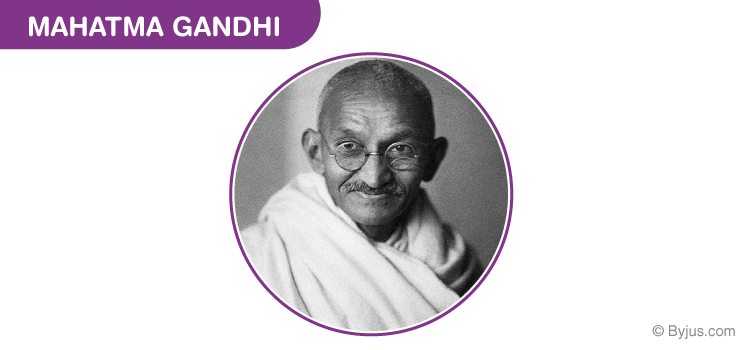
Mahatma Gandhi, a follower of non-violence and a messenger of truth, was born on 2nd October, 1869 in Porbandar, Gujarat. His full name was Mohandas Karamchand Gandhi, and he belonged to an affluent family. He was a good student with a shy nature. As he grew up, he went to England to study law and soon became a barrister. When he returned to India, he began practising law at the Bombay High Court.
Thereafter, he went to South Africa to practise law. However, he was not interested in the legal profession. He joined hands with the natives of that region and started a non-violent movement called Satyagraha, in order to fight against the oppression of the Europeans. Soon, he returned to India and joined the struggle for India’s Independence against the British.
Seeing the miserable plight of his fellow Indian brothers and sisters, he started the Non-Cooperation Movement and the Quit India Movement to revolt against British rule in India. He underwent a lot of suffering and made sacrifices to uproot the British from the Indian soil. He had a non-violent approach towards India’s fight for freedom from British rule.
Mahatma Gandhi was a noble soul who believed in simplicity. He propagated the use of Swadeshi (domestic) goods among the people and boycotted the use of foreign items. He was a secular preacher and treated people of different communities with equal respect. He used to wear simple clothes and encouraged the use of handspun fibres such as jute and khadi made with the help of the spinning wheel.
He was a man of strong conviction and played a crucial role in the struggle for India’s Independence. He was imprisoned several times but his love for India’s freedom remained his cherished goal. His birthday, 2nd October, is celebrated as ‘Gandhi Jayanti’, to offer homage to the veteran for his significant role in social and political reform towards India’s struggle for Independence. He is fondly remembered as the “Father of the Nation” in India for his undying efforts towards India’s fight for freedom.
10 Lines Essay on Mahatma Gandhi for Kids
- Mahatma Gandhi is famous as the father of the nation in India.
- He was born on October 2, 1869, in Porbandar, Gujarat.
- His father was Karamchand Gandhi, and his mother was Putlibai Gandhi.
- Gandhi married Kasturba Makhangi Kapadia in 1883.
- In the year 1888, he went to London to pursue his higher education.
- Gandhi fought against racial discrimination and was a civil rights activist in South Africa.
- Later, in 1915 he started the Indian National Congress party (INC).
- He believed that ‘Ahimsa’ (not harming anyone) would win us freedom and also followed another principle of ‘Satya Vachan’ (Speaking the Truth).
- In 1917, he began his first anti-British movement.
- He was assassinated on 30th January 1948.
Enjoyed reading the above Mahatma Gandhi essay in English for kids? You can explore more such amazing essay topics for kids and get all the most relevant essays for your little one at a single place.
Are you seeking a useful sample to help your kid write an essay about Mahatma Gandhi? Well, look no further! We are here to provide you with an essay on Mahatma Gandhi in English and have made it accessible for your kid. Your child can receive some guidance from our short essay on Mahatma Gandhi before drafting a few lines on this topic. We assure you that your kid would love this essay and can pick some wonderful ideas from it.
Furthermore, you can also access more engrossing resources such as General Knowledge Questions, Colourful Worksheets, Enchanting Stories, Easy Trivia Questions, Essays on the most frequently asked topics on our Kids Learning section and gift the best education to your child. You can also view BYJU’S website for other useful study material and make learning a fun-filled experience for your child.
Leave a Comment Cancel reply
Your Mobile number and Email id will not be published. Required fields are marked *
Request OTP on Voice Call
Post My Comment
- Share Share
Register with BYJU'S & Download Free PDFs
Register with byju's & watch live videos.
Talk to our experts
1800-120-456-456
- Mahatma Gandhi Essay

Important Essay on Mahatma Gandhi for Students in English
Mohandas Karamchand Gandhi, often called the 'Father of the Nation' , was a leader who fought for India's freedom from British rule. He believed in non-violence. Every year on October 2nd, Mahatma Gandhi's birthday is celebrated as Gandhi Jayanti to honor his efforts in freeing India.
English Essay on Mahatma Gandhi
Rabindranath Tagore was the first to call Gandhiji 'Mahatma,' which means 'Great Soul' in Sanskrit. His wise ideas and beliefs led people to respect and call him 'Mahatma Gandhi.' His dedication to the country and efforts to turn his ideas into reality make Indians around the world very proud of him .
According to Mahatma Gandhi’s biography, he was born on October 2, 1869 , in Porbandar, a coastal town in the present-day Indian state of Gujarat. He grew up in a Hindu family and ate basic vegetarian meals. His dad, Karamchand Uttamchand Gandhi, was an important leader in Porbandar State. In South Africa, he was the first to lead a peaceful protest movement, setting him apart from other demonstrators. Mahatma Gandhi also introduced the idea of Satyagraha, a nonviolent approach to opposing unfairness. He devoted 20 years of his life to battling discrimination in South Africa.
His idea of 'Ahimsa,' which means not hurting anyone, was widely admired and followed by many influential people worldwide. He became an indomitable figure who couldn't be defeated in any situation. Mahatma Gandhi initiated the 'Khadi Movement' to encourage the use of fabrics like khadi or jute. This movement was a crucial part of the larger 'Non-co-operation Movement,' which advocated for Indian goods and discouraged foreign ones. Gandhi strongly supported agriculture and encouraged people to engage in farming. He inspired Indians to embrace manual labor and emphasized self-reliance, urging them to provide for their needs and lead simple lives. He began weaving cotton clothes using the Charkha to reduce dependence on foreign goods and promote Swadeshi products among Indians.
During the fight for India's freedom, Gandhiji faced imprisonment several times along with his followers, but his main goal was always the freedom of his motherland. Even when he was in prison, he never chose the path of violence.
Mahatma Gandhi made significant contributions to various social issues. His efforts against 'untouchability' while he was in Yerwada Jail, where he went on a hunger strike against this ancient social evil, greatly helped uplift the oppressed community in modern times. He also emphasized the importance of education, cleanliness, health, and equality in society.
These qualities defined him as a person with a great soul and justified his transformation from Gandhi to Mahatma. He led many freedom movements, including the "Quit India Movement," which was highly successful. His death was a huge loss to the forces of peace and democracy, leaving a significant void in the nation's life.
Gopal Krishna Gokhale, a prominent Indian nationalist leader, significantly influenced Mahatma Gandhi's political ideology and leadership approach. Gandhi considered him his political teacher.
Mahatma Gandhi played a crucial role in India's fight for freedom from British rule. His life was dedicated to serving his country and its people, and he became an international symbol of Indian leadership. Even today, he continues to inspire and motivate young people worldwide with his values and principles.
Gandhi Ji was known for his strong sense of discipline. He emphasized the importance of self-discipline in achieving significant goals, a principle he applied in promoting his philosophy of Ahimsa (non-violence). Through his own life, he demonstrated that rigorous discipline can lead to the realization of any objective, provided we remain committed and dedicated. These qualities established him as a revered and respected leader whose influence extends far beyond his lifetime. His ideals continue to resonate not only in India but also around the world.

FAQs on Mahatma Gandhi Essay
1. What were the different movements that Gandhi started in order to bring Independence to India?
In order to bring freedom, Gandhi started the Satyagraha movement in 1919, the non-cooperation movement in 1921, and Civil Disobedience movement in 1930 and Quit India movement in 1942.
2. Who killed Mahatma Gandhi?
A young man named Nathuram Godse killed Mahatma Gandhi when he was going to attend an evening prayer meeting.
3. Why is Gandhi known as the ‘Father of the Nation’?
Mahatma Gandhi is known as the ‘Father of the Nation’ because he laid the true foundation of independent India with his noble ideals and supreme sacrifice.
4. How do we commemorate Mahatma Gandhi’s contribution for our Nation?
His birthday on 2 nd October is celebrated as a National Holiday across the nation in order to commemorate his great contributions and sacrifices for the country’s independence.
5. What are the things we should learn from Mahatma Gandhi?
There are various things one can learn from Gandhiji. The principles that he followed and preached his entire generation and for generations to come are commendable. He believed in ‘Ahimsa’ and taught people how any war in the world can be won through non-violence. To simply state one can learn the following principles from Gandhiji -
Nonviolence,
Respect for elders,

Mahatma Gandhi Essay 10 Lines in English, महात्मा गांधी निबंध 15 लाइन in Hindi
Take a look at Mahatma Gandhi Essay in 10 lines, 100, 150, and 300 words in English. Also get Mahatma Gandhi's essay in Hindi. Learn his essential teachings of Satya and ahimsa
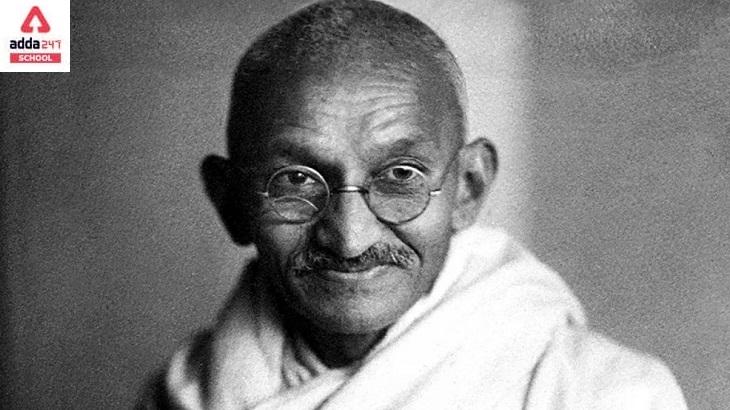
Table of Contents
Mahatma Gandhi Essay: Mahatma Gandhi Essay 10 Lines is a popular topic to write for primary school students during the celebration of Gandhi Jayanti. “The Father of the Nation” and the man who struggled to attain freedom for India was Mahatma Gandhi. He protested with the motto of non-violence and due to his extreme courage, the British had to leave India. After reading these Mahatma Gandhi Essay 10 Lines or Mahatma Gandhi essay in English, you will understand Mahatma Gandhi’s life and goals, his teachings, what part he played in India’s independence movement, and why he is the most revered leader in the world and how his birthday is commemorated in our country and so on. Let’s explore all the amazing महात्मा गांधी निबंध in the next part of this article.
Also Read, Lal Bahadur Shastri Essay in English
Mahatma Gandhi Essay 10 Lines
The Mahatma Gandhi Essay 10 Lines in English or महात्मा गांधी निबंध 15 लाइन in Hindi are prepared with basic yet powerful vocabulary so that you may rapidly absorb the information and use the information as required in your essay. Mahatma Gandhi is a person who followed the way of non-violence and truth to make the country free from the British Empire, was born on October 2nd, 1869 in Gujarat. He belonged to a very well-to-do family. Throughout his school and college days, he remained a shy boy but was a good and brilliant student. After completing school he went to England to study law and became a barrister. Then he returned to India and began to practice at the Bombay High Court. However, he was not interested in legal services due to the country’s situation. So, he joined the struggle for India’s Freedom.
Know more about National Flag of India.
Mahatma Gandhi Essay 10 Lines in English
The information used in the महात्मा गांधी निबंध 15 लाइन will also be useful for students in giving a speech, writing an essay, or competing in a speech-speaking contest on Gandhi Jayanti. See a sample Mahatma Gandhi essay 10 Lines in English below.
1. Mahatma Gandhi was born on October 2 in Porbandar, 2. He was born in Gujarat, to a Hindi family. 3. In Gujrat, his father served as the Diwan of Porbandar. 4. Kasturba Makhangi Kapadia, a woman, and he were married in May. 5. On September 4, 1888, he departed for London to pursue further education. 6. He campaigned against racial prejudice and started out as a civil rights activist in South Africa in 1893. 7. In 1915, he served as the Indian Nation Congress organization’s founder. 8. The title “Mahatma” was given to him in South Africa in 1914. 9. In India, Mahatma Gandhi was affectionately called ‘Bapu’ and ‘Gandhiji’. 10. He started his first movement against British rule in 1917.
Also Read, Independence Day Essay 2023

Mahatma Gandhi Essay in English
The real name of Mahatma Gandhi is “Mohandas Karamchand Gandhi”. He was born on 2nd October 1869. The birth location was Porbandar. His parents were “Karamchand Gandhi” and his mother, “Putlibai Gandhi”. He was the youngest among 3 other siblings. At the tender age of 13 years, he was married off to Kasturba Gandhi. After he completed his schooling at Porbandar, he left for South Africa to pursue law studies in 1890. For your information and education, below are some short and long Mahatma Gandhi Essay in English.
Read About: Article Writing
Essay on Mahatma Gandhi in 100 Words
An iconic figure in both Indian and global history, Mahatma Gandhi continues to stand for moral leadership and peaceful opposition. He was born in Porbandar, India, on October 2, 1869, and devoted his life to the pursuit of justice, the truth, and independence from British colonial control.
Gandhi’s nonviolent resistance, or satyagraha, doctrine served as the cornerstone of the Indian independence movement. His leadership of multiple campaigns and demonstrations, such as the Salt March and Quit India Movement, encouraged millions of people to take up the cause of freedom.
Gandhi promoted social reforms like equality, religious tolerance, and economic independence in addition to his political activity. He will remain forever as the towering symbol of peace and unity.
Mahatma Gandhi Essay 150 Words
Among the most important individuals of the 20th century was Mahatma Gandhi. Known as the Father of India, he spearheaded the country’s independence campaign. Gandhi was a fervent supporter of civil disobedience and nonviolence, and his strategies have served as an inspiration to social change organisations all across the world.
In 1869, Gandhi was born in Porbandar, India. After graduating from law school in England in 1891, he went back to India to practice. But he quickly got engaged in political and social activities. Gandhi visited South Africa in 1893 and saw firsthand the prejudice that Indians suffered there. He was motivated to fight for justice and equality for the rest of his life by this encounter.
Those who work for justice, peace, and human rights continue to find inspiration in his life and beliefs. An enduring and renowned personality in history, Gandhi is known for his unflinching adherence to his ideas and his dedication to the development of humanity.
Mahatma Gandhi Essay- Mahatma Gandhi in South Africa
Mahatma Gandhi Essay 10 Lines – In South Africa, during his studies, Mahatma Gandhi found that the Africans and Indians were discriminated against. They were not allowed to mix with the locals and had separate localities to reside in. They were even not allowed to drink the same water or food which the locals had.
Mahatma Gandhi was himself discriminated against and not allowed to board a first-class train as he did not belong to the white community. 21 years he stayed in South Africa. He felt the need for a change and protested against the policy which did not allow Indians to vote. He protested and others joined him in the move.
His protests slowly brought his hard work to notice and the British started respecting the Indians and Africans. They were now given more liberty and freedom as compared to earlier times. With this successful movement of “Satyagraha”, Mahatma Gandhi came to be known as a great politician in South Africa.
Also Read: Gopal Krishna Gokhale
Mahatma Gandhi Essay in English 300 Words
After 21 years of stay in South Africa, Mahatma Gandhi returned to India in 1914. He founded Satyagraha Ashram in 1915 intending to help Indians attain freedom. This was located at Sabarmati.
Staying in the ashram, he used to preach non-violence and started thinking of ways to fight against the British using non-violence. With the Rowlatt Act being passed, Mahatma Gandhi denied the civil liberty of the Indians. This was the start of his entry into Indian politics.
Eventually, he became the person who couldn’t be defeated under any circumstances and was made the leader of the Indian Freedom Movement. Three mass movements launched by him made the people of India believe in unity. The three movements were Non-Cooperation Movement in 1920, the Civil Disobedience movement in 1939, and the Quit India Movement in 1942.
The Quit India Movement was the greatest success with all the Indians protesting united under the guidance of Mohandas Karamchand Gandhi. This was the last movement against the British and they were forced to leave India. Thus, India achieved Independence.
Ace your CUET 2024 preparation with Adda247 live classes.
Mahatma Gandhi Essay- Death and Birthday
Mahatma Gandhi died an unnatural death. He died as Nathuram Godse shot him while he was on his way to evening prayers on January 30, 1948. Mahatma Gandhi’s birthday is celebrated on 2nd October by the nation in the form of a National holiday.
महात्मा गांधी पर लेख इंग्लिश में
Mahatma Gandhi, jinhone Bharat ke svatantrata sangram mein mahatvapurn bhumika nibhai aur ahinsa aur satyagraha ke prashankon ko prachin dharmik tatvon se jodkar ek naya andolan prastut kiya, unka janm 2nd October 1869 ko Porbandar, Gujarat mein hua tha. Unka janm naam Mohandas Karamchand Gandhi tha, lekin log unhe aamtaur par Bapu ke naam se jante hain.
Mahatma Gandhi Jivan Parichay in English
Shiksha aur Videsh Yatra: Gandhi ji ki shiksha Sabarmati Ashram, Ahmedabad aur Rajkot ke Alfred High School mein hui. Unhone videsh mein bhi padhai ki aur vahan ke samajik samasyaon se prabhavit hue. Videsh yatra ke baad, unhone vakalat ki padhai ki aur South Africa chale gaye.
Satyagraha in South Africa: Gandhi ji South Africa mein ek vakeel ke roop mein kaam karte hue vahan ke apartheid vyavastha ke khilaf awaz uthai. Vahan unhone ‘Satyagraha’ ka pratham prayog kiya, jise bad mein Bharat mein bhi prasiddhi mili.
Bharat Aana: Gandhi ji 1915 mein Bharat laut aaye aur unhone aadhunik Bharatiya svatantrata andolan ko ek naya marg dikhaya. Unhone Champaran, Kheda, aur Ahmedabad mein kisanon aur kamgaron ke liye satyagraha kiya.
Non-Cooperation Movement: Gandhi ji ne 1920 mein Bharat mein ‘Asahayog Andolan’ shuru kiya, jisme Bharatiya janata ko Angrezi samrajya ke virudh apni sahmati se asahayog karne ki ajadi di.
Salt March (Namak Satyagraha): Gandhi ji ke pramukh andolanon mein se ek tha Namak Satyagraha. Unhone 1930 mein Dandi March ke roop mein Namak Adhikar Andolan ko prarambh kiya.
Quit India Movement: 1942 mein, Gandhi ji ne ‘Bharat Chodo Andolan’ ko pramukh andolan banaya, jisme unhone Bharatiya samrajya ke virudh bharat ko azadi dene ki mang ki.
Bharat Ki Azadi: Gandhi ji ke pramukh neta banne ke baad, Bharat ko 1947 mein svatantrata mili aur vah desh ka pratham Rashtrapati bane.
Ahinsa aur Samrasta: Gandhi ji ne hamesha ahinsa, samrasta, aur samajik nyay ki or agrasar rahe. Unka pramukh sandesh tha ki “An eye for an eye makes the whole world blind.”
Assassination: Gandhi ji ki hatya 30th January 1948 ko Delhi mein Nathuram Godse dwara ki gayi. Unka nidhan bharat aur poore vishw ke logon ke liye ek bhari dukhad ghatna thi.
Gandhi ji ke pramukh siddhanton mein ahinsa, satyagraha, swadeshi, samrasta, aur sarvodaya shamil hain. Unka jivan ek prerna srot raha hai aur aaj bhi unki yaad dil mein hai. Gandhi ji ko Mahatma (Mahaan Atma) ke roop mein jana jata hai, aur unka yogdan bharat ki svatantrata aur antarrashtriya shanti ke kshetron mein mahatvapurn hai.
गांधीजी के बारे में 10 लाइन
1. महात्मा गांधी का जन्म 2 अक्टूबर को पोरबंदर में हुआ था,
2. उनका जन्म गुजरात में एक हिंदी परिवार में हुआ था। 3. गुजरात में, उनके पिता ने पोरबंदर के दीवान के रूप में सेवा की। 4. कस्तूरबा माखंगी कपाड़िया, एक महिला और उनकी शादी मई में हुई थी।
5. 4 सितंबर, 1888 को वे आगे की शिक्षा हासिल करने के लिए लंदन चले गए।
6. उन्होंने नस्लीय पूर्वाग्रह के खिलाफ अभियान चलाया और 1893 में दक्षिण अफ्रीका में एक नागरिक अधिकार कार्यकर्ता के रूप में शुरुआत की।
7. 1915 में, उन्होंने भारतीय राष्ट्र कांग्रेस संगठन के संस्थापक के रूप में कार्य किया।
8. 1914 में दक्षिण अफ्रीका में उन्हें “महात्मा” की उपाधि दी गई थी।
9. भारत में महात्मा गांधी को प्यार से ‘बापू’ और ‘गांधीजी’ कहा जाता था।
10. उन्होंने 1917 में ब्रिटिश शासन के खिलाफ अपना पहला आंदोलन शुरू किया।
महात्मा गांधी निबंध 15 लाइन
महात्मा गांधी निबंध:
- महात्मा गांधी भारतीय स्वतंत्रता संग्राम के महान नेता थे।
- उनका जन्म 2 अक्टूबर 1869 को पोरबंदर, गुजरात में हुआ था।
- उन्होंने नॉन-कोऑपरेशन मूवमेंट और सॉल्ट सत्याग्रह जैसे आंदोलनों का नेतृत्व किया।
- महात्मा गांधी को “बापू” के रूप में भारतीय लोगों द्वारा पुकारा जाता था।
- उन्होंने अहिंसा का पालन किया और सत्य के प्रति अपना पूरा आस्थान रखा।
- वे चरक्का और खड़ी चादर जैसे साम्बोलिक प्रतीक का उपयोग करते थे।
- गांधीजी ने भारतीयों को विशेष रूप से चरक्का सत्याग्रह के माध्यम से जोड़ा।
- उनका योगदान भारतीय स्वतंत्रता संग्राम को सफलता दिलाने में महत्वपूर्ण था।
- उन्होंने विश्वास किया कि आत्मा की शक्ति से ही बदलाव संभव है।
- उन्होंने असहमति के बावजूद शांति और साहमति की महत्वपूर्ण भूमिका निभाई।
- महात्मा गांधी का उद्धारण “आँख दिखाने में कीमत है” है।
- उन्होंने स्वच्छता अभियान की महत्वपूर्ण भूमिका निभाई।
- उनका आकर्षक व्यक्तित्व और सद्गुणों से भारतीयों का मनमोहन किया।
- महात्मा गांधी का निधन 30 जनवरी 1948 को हुआ, लेकिन उनकी यादें हमें सदैव याद रहेंगी।
- गांधीजी ने भारतीय स्वतंत्रता संग्राम के प्रति अपना अद्वितीय समर्पण और समर्पण दिखाया और उन्हें एक महान आदर्श माना जाता है।

महात्मा गांधी पर निबंध 20 लाइन
महात्मा गांधी एक महान भारतीय स्वतंत्रता संग्राम के महान नेता थे।
- महात्मा गांधी का जन्म 2 अक्टूबर 1869 को पोरबंदर, गुजरात में हुआ था।
- उन्हें ‘राष्ट्रपिता’ के रूप में सम्मानित किया गया है।
- उन्होंने अहिंसा और सत्याग्रह के सिद्धांतों का पालन किया और भारतीय स्वतंत्रता संग्राम को नेतृत्व किया।
- गांधी जी ने दंड मुक्ति आंदोलन, दांडी मार्च, चम्पारण आंदोलन, खिलाफत आंदोलन आदि महत्वपूर्ण आंदोलनों का आयोजन किया।
- उन्होंने अपार भारतीय जनता का साथ पाकर ब्रिटिश साम्राज्य के खिलाफ संघर्ष किया।
- महात्मा गांधी ने स्वच्छता और स्वदेशी आंदोलन के माध्यम से जनमानस को सजग किया और राष्ट्रीय आन्दोलनों को एक महान आदर्श प्रदान किया।
- उन्होंने अपनी जीवन में सरलता और निर्भरता के सिद्धांतों का पालन किया और जीवन को एक उदाहरण सेतु बनाया।
- गांधी जी का सपना था कि भारत स्वतंत्र हो और समृद्धि की ओर अग्रसर हो।
- उन्होंने जन जीवन में सादगी का पूरा उल्लंघन किया और खुद को स्वावलंबी बनाया।
- गांधी जी का निधन 30 जनवरी 1948 को नई दिल्ली में हुआ, जिसने भारतीय जनता को गहरी शोक में डाल दिया।
- उनके मृत्यु के बाद, उन्होंने भारतीय स्वतंत्रता संग्राम के लिए अपने महान योगदान के लिए हमें एक आदर्श और प्रेरणा स्रोत के रूप में रहा।
- उनके द्वारा प्रयाग में आयोजित ‘हरि-कथा’ और ‘भागवत कथा’ की आयोजना भारतीय स्वतंत्रता संग्राम की आग में और बढ़ा दी।
- गांधी जी का आदर्श आज भी हमें सच्चाई, न्याय, और सामाजिक न्याय के प्रति समर्पित रहने की प्रेरणा देता है।
- उन्होंने खुद को स्वयं को अपने कार्यों के माध्यम से सबके लिए समर्पित किया और सर्वोदय की भावना को प्रोत्साहित किया।
- उन्होंने विविधता की प्राप्ति की बजाय एकता और अखंडता की प्राथमिकता दी।
- उनकी आत्मकथा ‘मेरे आत्मकथा’ भारतीय लोगों के बीच उनके जीवन और विचारों के बारे में अधिक जानकारी प्रदान करती है।
- महात्मा गांधी का आदर्श आज भी हमारे समाज को एकता, शांति, और समृद्धि की दिशा में मार्गदर्शन करता है।
- उन्होंने अपने शिक्षार्थियों को शिक्षा के माध्यम से जागरूक और सशक्त बनाने का प्रयास किया।
- गांधी जी के आदर्शों का पालन करके हम भारत को एक बेहतर और समृद्धि योग्य देश बना सकते हैं।
- गांधी जी की स्मृति को श्रद्धांजलि देते हैं और उनके योगदान को कभी नहीं भूलते हैं।
Mahatma Gandhi ka Nibandh
महात्मा गांधी निबंध: “राष्ट्रपिता” और भारत के लिए स्वतंत्रता प्राप्त करने के लिए संघर्ष करने वाले व्यक्ति महात्मा गांधी थे। उन्होंने अहिंसा के आदर्श वाक्य का विरोध किया और उनके अत्यधिक साहस के कारण, अंग्रेजों को भारत छोड़ना पड़ा।
महात्मा गांधी एक ऐसे व्यक्ति हैं जिन्होंने देश को ब्रिटिश साम्राज्य से मुक्त करने के लिए अहिंसा और सत्य का मार्ग अपनाया, उनका जन्म 2 अक्टूबर, 1869 को गुजरात में हुआ था। वह एक बहुत ही संपन्न परिवार से ताल्लुक रखता था। अपने स्कूल और कॉलेज के दिनों में, वह एक शर्मीला लड़का बना रहा, लेकिन एक अच्छा और मेधावी छात्र था। स्कूल की पढ़ाई पूरी करने के बाद वे कानून की पढ़ाई के लिए इंग्लैंड चले गए और बैरिस्टर बन गए। फिर वे भारत लौट आए और बॉम्बे हाई कोर्ट में प्रैक्टिस करने लगे। लेकिन देश की स्थिति के कारण उन्हें कानूनी सेवाओं में कोई दिलचस्पी नहीं थी। इसलिए, वह भारत की स्वतंत्रता के लिए संघर्ष में शामिल हो गए।
महात्मा गांधी का असली नाम “मोहनदास करमचंद गांधी” है। उनका जन्म 2 अक्टूबर 1869 को हुआ था। जन्म स्थान पोरबंदर था। उनके माता-पिता “करमचंद गांधी” और माता, “पुतलीबाई गांधी” थे।
वह 3 अन्य भाई-बहनों में सबसे छोटा था। 13 वर्ष की अल्पायु में ही उनका विवाह कस्तूरबा गांधी से कर दिया गया। पोरबंदर में अपनी स्कूली शिक्षा पूरी करने के बाद, वे 1890 में कानून की पढ़ाई करने के लिए दक्षिण अफ्रीका चले गए।
दक्षिण अफ्रीका में, अपने अध्ययन के दौरान, महात्मा गांधी ने पाया कि अफ्रीकियों और भारतीयों के साथ भेदभाव किया जाता था। उन्हें स्थानीय लोगों के साथ घुलने-मिलने की अनुमति नहीं थी और रहने के लिए अलग-अलग इलाके थे। उन्हें वही पानी या भोजन पीने की भी अनुमति नहीं थी जो स्थानीय लोगों के पास था।
महात्मा गांधी के साथ स्वयं भेदभाव किया गया था और उन्हें प्रथम श्रेणी की ट्रेन में चढ़ने की अनुमति नहीं दी गई थी क्योंकि वे श्वेत समुदाय से संबंधित नहीं थे। 21 साल वह दक्षिण अफ्रीका में रहे। उन्होंने बदलाव की आवश्यकता महसूस की और उस नीति का विरोध किया जिसने भारतीयों को वोट देने की अनुमति नहीं दी। उन्होंने इसका विरोध किया और अन्य लोग उनके साथ इस कदम में शामिल हो गए।
उनके विरोध ने धीरे-धीरे उनकी कड़ी मेहनत को नोटिस में लाया और अंग्रेजों ने भारतीयों और अफ्रीकियों का सम्मान करना शुरू कर दिया। उन्हें अब पहले के समय की तुलना में अधिक स्वतंत्रता और स्वतंत्रता दी गई थी। “सत्याग्रह” के इस सफल आंदोलन के साथ, महात्मा गांधी को दक्षिण अफ्रीका में एक महान राजनेता के रूप में जाना जाने लगा।
दक्षिण अफ्रीका में 21 साल रहने के बाद, महात्मा गांधी 1914 में भारत लौट आए। उन्होंने 1915 में सत्याग्रह आश्रम की स्थापना की, जिसका उद्देश्य भारतीयों को स्वतंत्रता प्राप्त करने में मदद करना था। यह साबरमती में स्थित था।
आश्रम में रहकर वे अहिंसा का उपदेश देते थे और अहिंसा का प्रयोग करते हुए अंग्रेजों से लड़ने के उपाय सोचने लगे। रॉलेट एक्ट पारित होने के साथ, महात्मा गांधी ने भारतीयों की नागरिक स्वतंत्रता से इनकार कर दिया। यह भारतीय राजनीति में उनके प्रवेश की शुरुआत थी।
आखिरकार, वे ऐसे व्यक्ति बन गए जिन्हें किसी भी परिस्थिति में पराजित नहीं किया जा सकता था और उन्हें भारतीय स्वतंत्रता आंदोलन का नेता बनाया गया था। उनके द्वारा चलाए गए तीन जन आंदोलनों ने भारत के लोगों को एकता में विश्वास दिलाया। 1920 में असहयोग आंदोलन, 1939 में सविनय अवज्ञा आंदोलन और 1942 में भारत छोड़ो आंदोलन तीन आंदोलन थे।
मोहनदास करमचंद गांधी के मार्गदर्शन में एकजुट होकर विरोध करने वाले सभी भारतीयों के साथ भारत छोड़ो आंदोलन सबसे बड़ी सफलता थी। यह अंग्रेजों के खिलाफ अंतिम आंदोलन था और उन्हें भारत छोड़ने के लिए मजबूर किया गया था। इस प्रकार भारत ने स्वतंत्रता प्राप्त की।
महात्मा गांधी की अप्राकृतिक मृत्यु हुई। 30 जनवरी, 1948 को शाम की प्रार्थना के लिए जाते समय नाथूराम गोडसे ने उन्हें गोली मार दी, क्योंकि उनकी मृत्यु हो गई। महात्मा गांधी का जन्मदिन 2 अक्टूबर को राष्ट्र द्वारा राष्ट्रीय अवकाश के रूप में मनाया जाता है।
Mahatma Gandhi Photo
Mahatma Gandhi’s photo is given below.
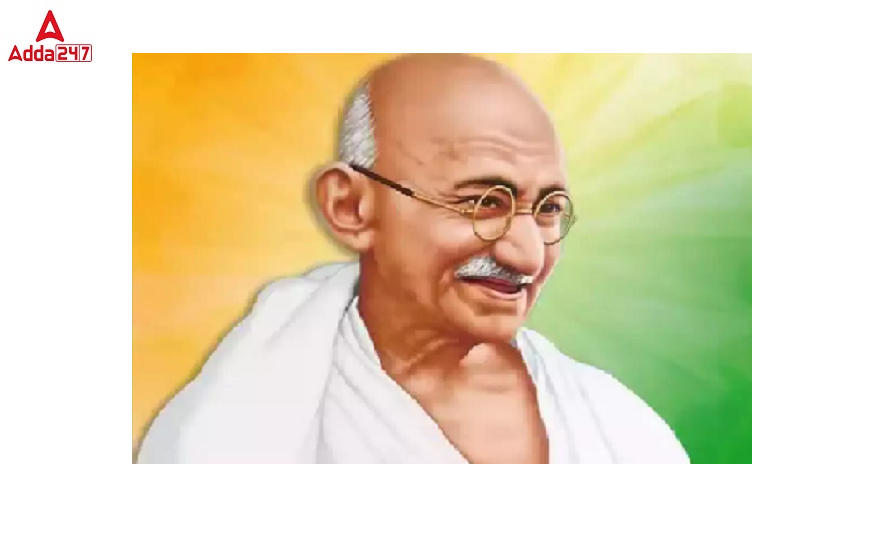
Mahatma Gandhi Essay Drawing
Mahatma Gandhi’s Drawing is given Below. check here.
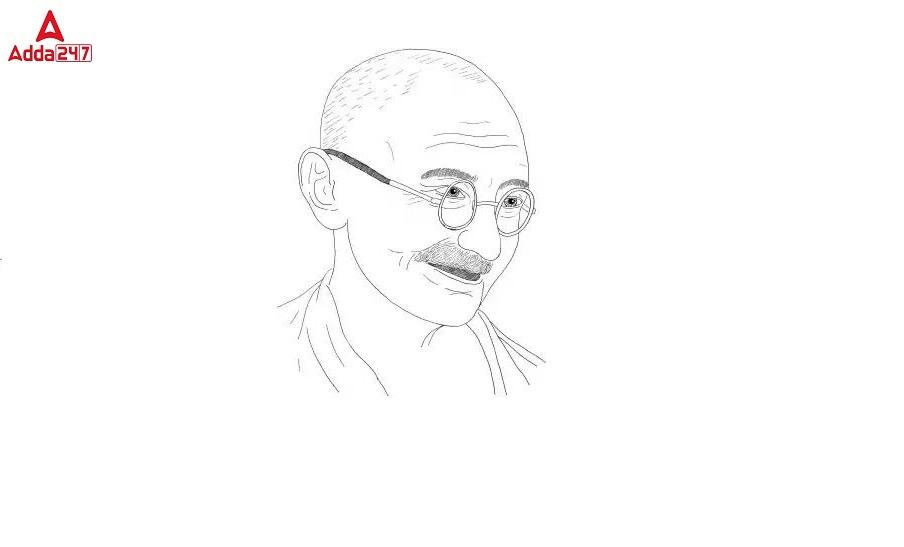
Sharing is caring!

Leave a comment
Your email address will not be published. Required fields are marked *
Save my name, email, and website in this browser for the next time I comment.
Trending Articles
- CBSE Class 10 Result 2024
- CBSE Class 12th Result 2024
- CGBSE 10th Result 2024
- NEET Question Paper 2024
- NEET Answer Key 2024 All Sets
- NEET Exam Analysis 2024
- NEET Expected Cut Off 2024

CBSE Board Exam 2024
- CBSE Class 10 Syllabus 2024
- CBSE Class 12 Syllabus 2024
- CBSE Previous Year Papers
- CUET Syllabus
- CUET Previous Year paper
- CUET Participating College & Universities
- JEE Main 2024
- JEE Main Syllabus 2024
- JEE Main Exam Analysis 2023
- NEET 2024
- NEET Syllabus 2024
- NEET State wise Cut off
- NEET Rank Predictor
- NEET OMR Sheet
- NEET College Predictor
Recent Posts
Important exams, ncert solutions.
- NCERT Class 12
- NCERT Class 11
- NCERT Class 10
- NCERT Class 9
NCERT Books
School syllabus.
- CBSE Class 12
- CBSE Class 11
- CBSE Class 10
- CBSE Class 9
- JEE Mains 2024
Our Other Websites
- Teachers Adda
- Bankers Adda
- Current Affairs
- Adda Bengali
- Engineers Adda
- Adda Marathi
- Adda School

Get all your queries solved in one single place. We at Adda247 school strive each day to provide you the best material across the online education industry. We consider your struggle as our motivation to work each day.
Download Adda247 App
Follow us on
- Responsible Disclosure Program
- Cancellation & Refunds
- Terms & Conditions
- Privacy Policy
- CBSE Class 10th
- CBSE Class 12th
- UP Board 10th
- UP Board 12th
- Bihar Board 10th
- Bihar Board 12th
- Top Schools in India
- Top Schools in Delhi
- Top Schools in Mumbai
- Top Schools in Chennai
- Top Schools in Hyderabad
- Top Schools in Kolkata
- Top Schools in Pune
- Top Schools in Bangalore
Products & Resources
- JEE Main Knockout April
- Free Sample Papers
- Free Ebooks
- NCERT Notes
- NCERT Syllabus
- NCERT Books
- RD Sharma Solutions
- Navodaya Vidyalaya Admission 2024-25
- NCERT Solutions
- NCERT Solutions for Class 12
- NCERT Solutions for Class 11
- NCERT solutions for Class 10
- NCERT solutions for Class 9
- NCERT solutions for Class 8
- NCERT Solutions for Class 7
- JEE Main 2024
- MHT CET 2024
- JEE Advanced 2024
- BITSAT 2024
- View All Engineering Exams
- Colleges Accepting B.Tech Applications
- Top Engineering Colleges in India
- Engineering Colleges in India
- Engineering Colleges in Tamil Nadu
- Engineering Colleges Accepting JEE Main
- Top IITs in India
- Top NITs in India
- Top IIITs in India
- JEE Main College Predictor
- JEE Main Rank Predictor
- MHT CET College Predictor
- AP EAMCET College Predictor
- GATE College Predictor
- KCET College Predictor
- JEE Advanced College Predictor
- View All College Predictors
- JEE Main Question Paper
- JEE Main Cutoff
- JEE Main Advanced Admit Card
- AP EAPCET Hall Ticket
- Download E-Books and Sample Papers
- Compare Colleges
- B.Tech College Applications
- KCET Result
- MAH MBA CET Exam
- View All Management Exams
Colleges & Courses
- MBA College Admissions
- MBA Colleges in India
- Top IIMs Colleges in India
- Top Online MBA Colleges in India
- MBA Colleges Accepting XAT Score
- BBA Colleges in India
- XAT College Predictor 2024
- SNAP College Predictor
- NMAT College Predictor
- MAT College Predictor 2024
- CMAT College Predictor 2024
- CAT Percentile Predictor 2023
- CAT 2023 College Predictor
- CMAT 2024 Admit Card
- TS ICET 2024 Hall Ticket
- CMAT Result 2024
- MAH MBA CET Cutoff 2024
- Download Helpful Ebooks
- List of Popular Branches
- QnA - Get answers to your doubts
- IIM Fees Structure
- AIIMS Nursing
- Top Medical Colleges in India
- Top Medical Colleges in India accepting NEET Score
- Medical Colleges accepting NEET
- List of Medical Colleges in India
- List of AIIMS Colleges In India
- Medical Colleges in Maharashtra
- Medical Colleges in India Accepting NEET PG
- NEET College Predictor
- NEET PG College Predictor
- NEET MDS College Predictor
- NEET Rank Predictor
- DNB PDCET College Predictor
- NEET Admit Card 2024
- NEET PG Application Form 2024
- NEET Cut off
- NEET Online Preparation
- Download Helpful E-books
- Colleges Accepting Admissions
- Top Law Colleges in India
- Law College Accepting CLAT Score
- List of Law Colleges in India
- Top Law Colleges in Delhi
- Top NLUs Colleges in India
- Top Law Colleges in Chandigarh
- Top Law Collages in Lucknow
Predictors & E-Books
- CLAT College Predictor
- MHCET Law ( 5 Year L.L.B) College Predictor
- AILET College Predictor
- Sample Papers
- Compare Law Collages
- Careers360 Youtube Channel
- CLAT Syllabus 2025
- CLAT Previous Year Question Paper
- NID DAT Exam
- Pearl Academy Exam
Predictors & Articles
- NIFT College Predictor
- UCEED College Predictor
- NID DAT College Predictor
- NID DAT Syllabus 2025
- NID DAT 2025
- Design Colleges in India
- Top NIFT Colleges in India
- Fashion Design Colleges in India
- Top Interior Design Colleges in India
- Top Graphic Designing Colleges in India
- Fashion Design Colleges in Delhi
- Fashion Design Colleges in Mumbai
- Top Interior Design Colleges in Bangalore
- NIFT Result 2024
- NIFT Fees Structure
- NIFT Syllabus 2025
- Free Design E-books
- List of Branches
- Careers360 Youtube channel
- IPU CET BJMC
- JMI Mass Communication Entrance Exam
- IIMC Entrance Exam
- Media & Journalism colleges in Delhi
- Media & Journalism colleges in Bangalore
- Media & Journalism colleges in Mumbai
- List of Media & Journalism Colleges in India
- CA Intermediate
- CA Foundation
- CS Executive
- CS Professional
- Difference between CA and CS
- Difference between CA and CMA
- CA Full form
- CMA Full form
- CS Full form
- CA Salary In India
Top Courses & Careers
- Bachelor of Commerce (B.Com)
- Master of Commerce (M.Com)
- Company Secretary
- Cost Accountant
- Charted Accountant
- Credit Manager
- Financial Advisor
- Top Commerce Colleges in India
- Top Government Commerce Colleges in India
- Top Private Commerce Colleges in India
- Top M.Com Colleges in Mumbai
- Top B.Com Colleges in India
- IT Colleges in Tamil Nadu
- IT Colleges in Uttar Pradesh
- MCA Colleges in India
- BCA Colleges in India
Quick Links
- Information Technology Courses
- Programming Courses
- Web Development Courses
- Data Analytics Courses
- Big Data Analytics Courses
- RUHS Pharmacy Admission Test
- Top Pharmacy Colleges in India
- Pharmacy Colleges in Pune
- Pharmacy Colleges in Mumbai
- Colleges Accepting GPAT Score
- Pharmacy Colleges in Lucknow
- List of Pharmacy Colleges in Nagpur
- GPAT Result
- GPAT 2024 Admit Card
- GPAT Question Papers
- NCHMCT JEE 2024
- Mah BHMCT CET
- Top Hotel Management Colleges in Delhi
- Top Hotel Management Colleges in Hyderabad
- Top Hotel Management Colleges in Mumbai
- Top Hotel Management Colleges in Tamil Nadu
- Top Hotel Management Colleges in Maharashtra
- B.Sc Hotel Management
- Hotel Management
- Diploma in Hotel Management and Catering Technology
Diploma Colleges
- Top Diploma Colleges in Maharashtra
- UPSC IAS 2024
- SSC CGL 2024
- IBPS RRB 2024
- Previous Year Sample Papers
- Free Competition E-books
- Sarkari Result
- QnA- Get your doubts answered
- UPSC Previous Year Sample Papers
- CTET Previous Year Sample Papers
- SBI Clerk Previous Year Sample Papers
- NDA Previous Year Sample Papers
Upcoming Events
- NDA Application Form 2024
- UPSC IAS Application Form 2024
- CDS Application Form 2024
- CTET Admit card 2024
- HP TET Result 2023
- SSC GD Constable Admit Card 2024
- UPTET Notification 2024
- SBI Clerk Result 2024
Other Exams
- SSC CHSL 2024
- UP PCS 2024
- UGC NET 2024
- RRB NTPC 2024
- IBPS PO 2024
- IBPS Clerk 2024
- IBPS SO 2024
- Top University in USA
- Top University in Canada
- Top University in Ireland
- Top Universities in UK
- Top Universities in Australia
- Best MBA Colleges in Abroad
- Business Management Studies Colleges
Top Countries
- Study in USA
- Study in UK
- Study in Canada
- Study in Australia
- Study in Ireland
- Study in Germany
- Study in China
- Study in Europe
Student Visas
- Student Visa Canada
- Student Visa UK
- Student Visa USA
- Student Visa Australia
- Student Visa Germany
- Student Visa New Zealand
- Student Visa Ireland
- CUET PG 2024
- IGNOU B.Ed Admission 2024
- DU Admission 2024
- UP B.Ed JEE 2024
- LPU NEST 2024
- IIT JAM 2024
- IGNOU Online Admission 2024
- Universities in India
- Top Universities in India 2024
- Top Colleges in India
- Top Universities in Uttar Pradesh 2024
- Top Universities in Bihar
- Top Universities in Madhya Pradesh 2024
- Top Universities in Tamil Nadu 2024
- Central Universities in India
- CUET Exam City Intimation Slip 2024
- IGNOU Date Sheet
- CUET Mock Test 2024
- CUET Admit card 2024
- CUET PG Syllabus 2024
- CUET Participating Universities 2024
- CUET Previous Year Question Paper
- CUET Syllabus 2024 for Science Students
- E-Books and Sample Papers
- CUET Exam Pattern 2024
- CUET Exam Date 2024
- CUET Syllabus 2024
- IGNOU Exam Form 2024
- CUET UG Admit Card 2024 (Out) Live
- CUET 2024 Admit Card
Engineering Preparation
- Knockout JEE Main 2024
- Test Series JEE Main 2024
- JEE Main 2024 Rank Booster
Medical Preparation
- Knockout NEET 2024
- Test Series NEET 2024
- Rank Booster NEET 2024

Online Courses
- JEE Main One Month Course
- NEET One Month Course
- IBSAT Free Mock Tests
- IIT JEE Foundation Course
- Knockout BITSAT 2024
- Career Guidance Tool
Top Streams
- IT & Software Certification Courses
- Engineering and Architecture Certification Courses
- Programming And Development Certification Courses
- Business and Management Certification Courses
- Marketing Certification Courses
- Health and Fitness Certification Courses
- Design Certification Courses
Specializations
- Digital Marketing Certification Courses
- Cyber Security Certification Courses
- Artificial Intelligence Certification Courses
- Business Analytics Certification Courses
- Data Science Certification Courses
- Cloud Computing Certification Courses
- Machine Learning Certification Courses
- View All Certification Courses
- UG Degree Courses
- PG Degree Courses
- Short Term Courses
- Free Courses
- Online Degrees and Diplomas
- Compare Courses
Top Providers
- Coursera Courses
- Udemy Courses
- Edx Courses
- Swayam Courses
- upGrad Courses
- Simplilearn Courses
- Great Learning Courses
Mahatma Gandhi Essay for Students in English - 100, 200, 500 Words Essay
Gandhiji was a great believer in ahimsa, or nonviolence, and pursued the path of Satya vachan, or truthfulness. He was a humble person who taught the people of India to be simple and self-sufficient. People from all walks of life adored and admired him.
100 Words Essay On Mahatma Gandhi
Mahatma Gandhi is known as the Mahatma for his outstanding deeds and excellence throughout his life. He was a renowned freedom warrior and non-violent campaigner who lived his life following nonviolence while pushing India to independence from British control.
He was only 18 years old while studying law in England. Later, he travelled to the British colony of South Africa to practise law, where he was distinguished from the light-skinned population due to his black skin. That is why he became a political activist to effect good change in such inequitable legislation.

Later, he returned to India and launched a formidable and nonviolent struggle to achieve India's independence. In 1930, he led the Salt March (Namak Satyagrah, Salt Satyagrah, or Dandi March). He motivated many Indians to fight for their freedom from British tyranny.
200 Words Essay On Mahatma Gandhi
Mahatma Gandhi, born on October 2, 1869, in Porbander, India, was a prominent Indian leader who led India in its fight for freedom from British control. He finished his education in India before moving to England to study law. He began assisting the people of India who had been humiliated and abused by British rule. To combat British oppression, Gandhi chose the path of non-violence.
Campaigns | Gandhi was ridiculed several times, yet he persisted in his nonviolent campaign for India's independence. He was a renowned leader of the Indian independence movement who fought hard for India's freedom. After returning to India, he initiated independence campaigns such as non-cooperation, civil disobedience, and, subsequently, the Quit India Movement, all of which successfully contributed to India's independence.
Struggle For Freedom | As a impactful freedom fighter, Gandhi was jailed and imprisoned several times, yet he persisted in battling against British tyranny for Indian justice. He was a firm believer in nonviolence and the solidarity of people of all faiths, which he upheld throughout his campaign for independence. After several struggles with many Indians, he and other freedom fighters were eventually successful in establishing India as an independent country on August 15, 1947. Later, he was assassinated by Nathuram Godse, a Hindu activist, on January 30' 1948.
500 Words Essay On Mahatma Gandhi
In India, Mahatma Gandhi is known as "Bapu" or "Rastrapita." Mohandas Karamchand Gandhi is his full name. And, like the title conferred upon him, his sacrifices for the country and attempts to make his principles a reality are a source of immense pride for Indians worldwide.
Gandhi’s Childhood
Gandhi was born in Porbandar, Gujarat, India, on October 2, 1869. He grew up in a Hindu home and mainly ate vegetarian meals. His father, Karamchand Uttamchand Gandhi, was the Dewan of Porbandar State. He was the first to launch a peaceful protest movement in South Africa, distinguishing him from other demonstrators. Mahatma Gandhi also coined Satyagraha, a nonviolent method of fighting injustice.
Gandhi’s Principles
Gandhi was well-known for his strict discipline. He was a man of ethics, principles, and discipline who continues to inspire and encourage young people worldwide. He was always preaching the value of self-discipline in life. He thought it would aid in achieving larger aims, which he also used to promote his Ahimsa ideas. As he demonstrated in his life, rigorous discipline can help us accomplish any objective if we attempt to stay and commit ourselves to it. These characteristics made him a man with a great spirit and justified his transformation from Gandhi to Mahatma.
Contribution To Freedom Struggle
Mahatma Gandhi's impact on numerous societal concerns cannot be overstated.
Khadi Movement | Mahatma Gandhi launched the 'Khadi Movement' to promote using natural fibres such as khadi and jute. The Khadi Movement was part of the larger "Non-cooperation Movement," which supported the use of Indian goods and discouraged foreign goods.
Agriculture | Mahatma Gandhi was a major advocate of agriculture and encouraged people to work in agriculture.
Self- Sufficiency | He urged Indians to engage in physical labour and advised them to gather resources to live a simple life and become self-sufficient. He began weaving cotton clothing with Charkha to avoid using foreign goods and encouraged the use of Swadeshi items among Indians.
Untouchablity | During his detention in the Yerwada Jail, where he fasted against the age-old scourge of 'untouchability' in society, he tremendously aided the community's upliftment in the modern day. He also promoted education, hygiene, health, and equality in society.
Secularism | Gandhi made yet another contribution: secularism. He held that no religion should have a monopoly on truth. Mahatma Gandhi promoted inter-religious friendship.
Campaigns Gandhi Led
During the Indian Independence fight, Gandhi suffered and was imprisoned multiple times with his supporters, but independence for his country remained his primary desire. Even after being imprisoned, he never returned to the path of violence. He led various liberation movements and founded the "Quit India Movement." The Quit India Campaign was a huge success. Mahatma Gandhi was a crucial contributor to India's freedom from British domination. In 1930, Mahatma Gandhi launched the Civil Disobedience Movement. It was a behaviour that entailed refusing to obey any oppressive instructions or regulations. As a result, this tactic and its enforcers were subjected to severe violence and cruelty.
Gandhi’s death was the most devastating blow to the causes of peace and democracy. His demise left a massive void in the life of the country.
Applications for Admissions are open.

Aakash iACST Scholarship Test 2024
Get up to 90% scholarship on NEET, JEE & Foundation courses

ALLEN Digital Scholarship Admission Test (ADSAT)
Register FREE for ALLEN Digital Scholarship Admission Test (ADSAT)

JEE Main Important Physics formulas
As per latest 2024 syllabus. Physics formulas, equations, & laws of class 11 & 12th chapters

PW JEE Coaching
Enrol in PW Vidyapeeth center for JEE coaching

PW NEET Coaching
Enrol in PW Vidyapeeth center for NEET coaching

JEE Main Important Chemistry formulas
As per latest 2024 syllabus. Chemistry formulas, equations, & laws of class 11 & 12th chapters
Download Careers360 App's
Regular exam updates, QnA, Predictors, College Applications & E-books now on your Mobile
Certifications
We Appeared in

10 Lines on Mahatma Gandhi
Mahatma Gandhi Essay in English 10 Lines: Mohandas Karamchand Gandhi is the Father of the Nation. He was one of the greatest freedom fighters of India and today because of him and many other fighters India is an independent, democratic and secular country.
He was born on 2 October and his birth date is a national holiday in India. People celebrate Gandhi Jayanti throughout India. In this article we’ll talk about the great man, Gandhi in 4 Sets each containing 10 lines.
Table of Contents
Mahatma Gandhi Essay in English 10 Lines
- Mahatma Gandhi was born on 2 October 1869.
- The full name of Gandhiji is Mohandas Karamchand Gandhi.
- He was a great leader and a polite man.
- He was born in Porbandar, Gujarat.
- He studied law at the University of Bombay.
- He completed his graduation from University of London in 1891.
- He was an Indian lawyer, anti-colonial nationalist and politician.
- He followed the non-violent path to get civil rights.
- His father was the Chief Minister of Porbandar.
- The names of Gandhi’s parents are Karamchand Gandhi and Pitubai.
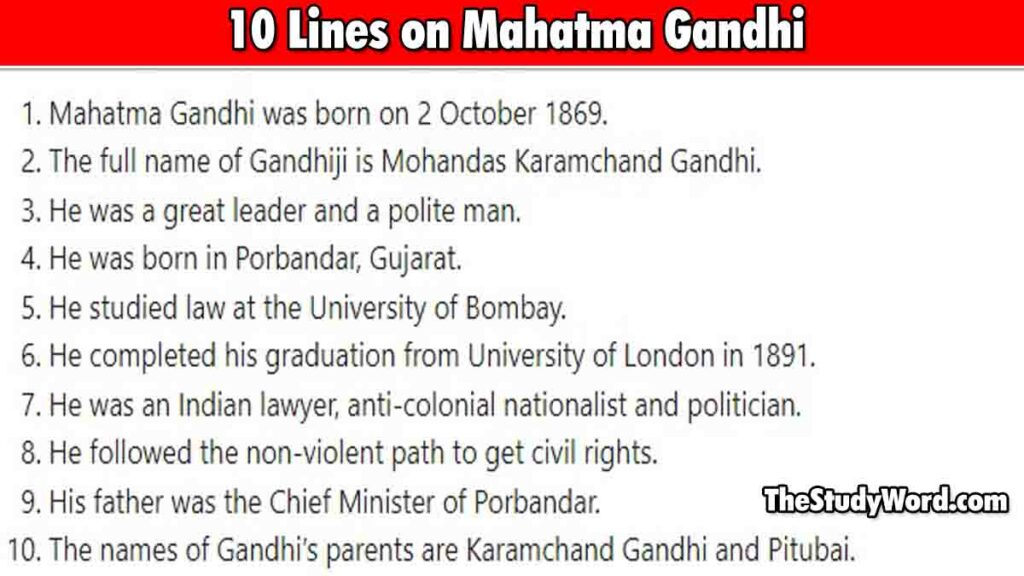
Mahatma Gandhi Essay 10 Lines
- Mohandas Karamchand Gandhi struggled a lot for Indian Independence.
- Gandhi was married to Kasturba Makhanji when he was 13 years old and had 4 sons.
- Gandhi made the Satyagraha, the salt march to Dandi.
- Satyagraha was in action from March 12 to April 6 in 1930.
- He walked on the principle of non-violence (ahinsa).
- When he was young he faced racism wherever he went.
- Once he was thrown out of the train even while having a first class train ticket.
- He learned so many things from these incidents.
- He started unifying people of India.
- He was also jailed along with many other leaders on many occasions.
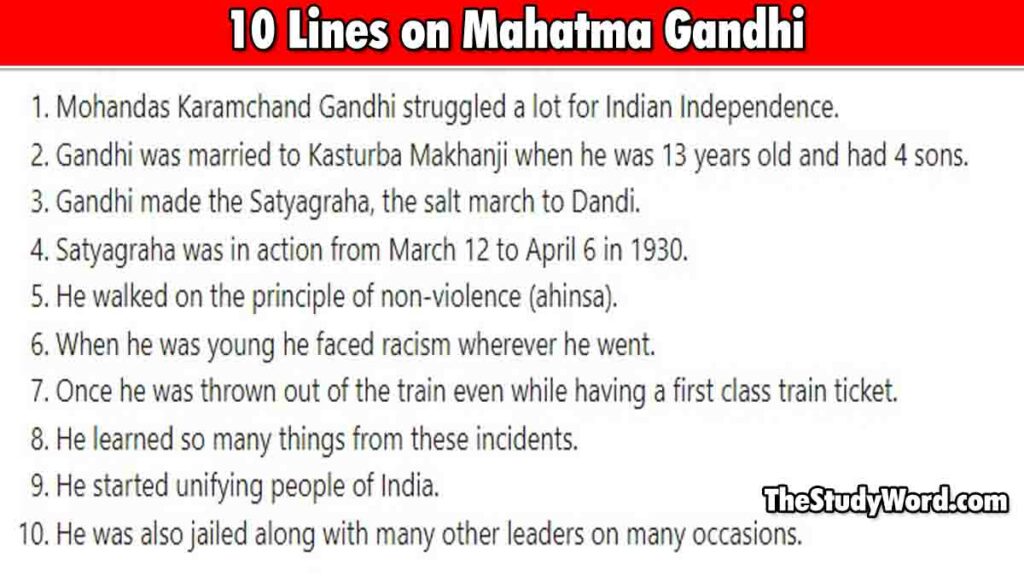
- Essay on Mahatma Gandhi
- Paragraph on Mahatma Gandhi in English
10 Lines About Mahatma Gandhi
- Gandhi is called the ‘Father of the Nation’.
- Mahatma Gandhi was a great freedom fighter.
- He dressed like a simple man and wore khadi clothes.
- He was very humble and these qualities were the reason why he was called “bapu”.
- Gandhi died on January 30, 1948.
- He was shot three times in his chest.
- Gandhi played a major role in getting freedom for India.
- Gandhi and other nationalists struggled for Indian independence until they finally got free from British rule in 1947.
- He was a very calm person and always thought about making peace with every situation.
- He walked on the principle of Secularism, Satyagraha and non-violence.
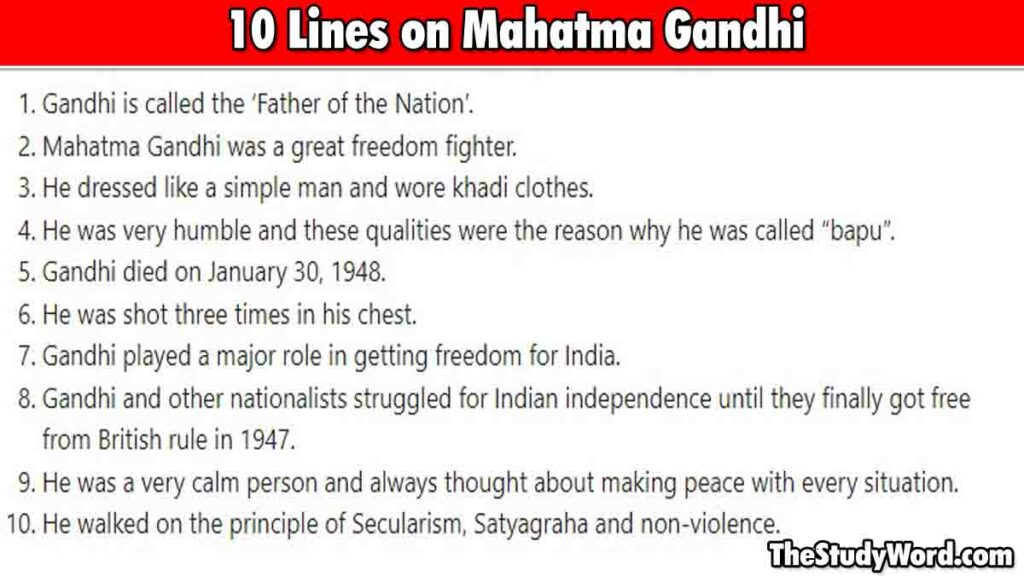
10 Lines on Mahatma Gandhi in English
- Gandhi wanted to unify India and make it a secular place.
- He wanted to unite Hindus and Muslims with political and economic stability.
- He struggled to make peace and free Indians from the British colonial rule.
- Gandhi-Irwin pact was signed in March 1931 to release the prisoners who were not violent during the Civil Disobedience Act.
- He also improved the life of the oppressed community and the untouchables.
- He called the untouchables, Harijans which means the children of God.
- He was the leader of the Indian Nationalist Movement.
- His “ Quit India ” movement led to the arrest of many innocent people.
- He was then arrested in Mumbai and kept behind the bars for 2 years.
- During the time when he was in jail, his wife passed away.
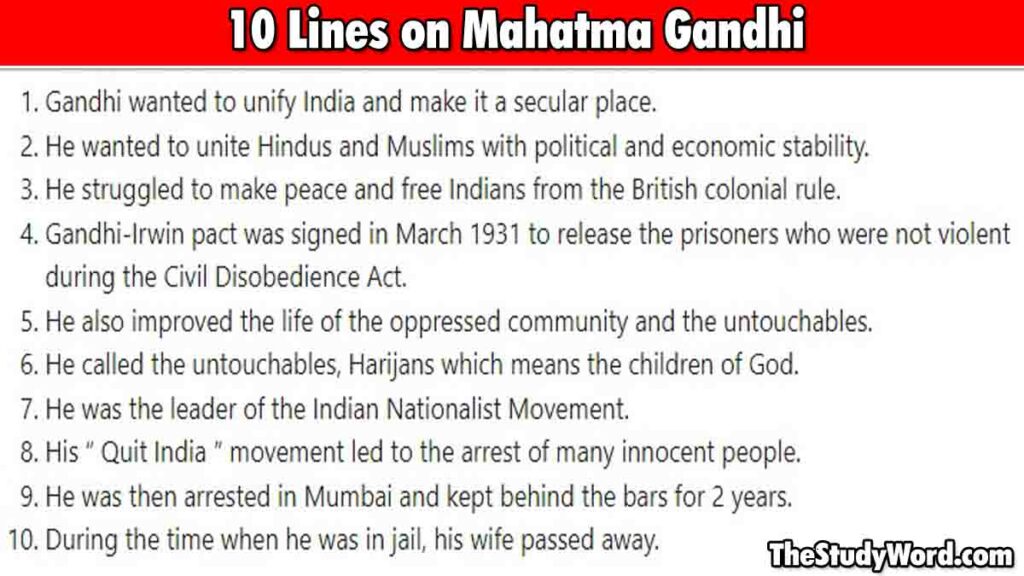
A man like Gandhi could never be born again. His principles teach us a lot about life. He was a man of words. Even today people shed their tears and pay tribute to Gandhi on Gandhi Jayanti in remembrance of his struggle and him. I hope this article helps you.
10 Lines on Computer
10 Lines on My Hobby
10 Lines on My Best Friend
10 Lines on Independence Day
Leave a Comment Cancel reply
Save my name, email, and website in this browser for the next time I comment.
10 Lines On Mahatma Gandhi
Learn about 10 lines on mahatma gandhi. gain knowledge of his significant contributions, perfect for educational use among children and students..
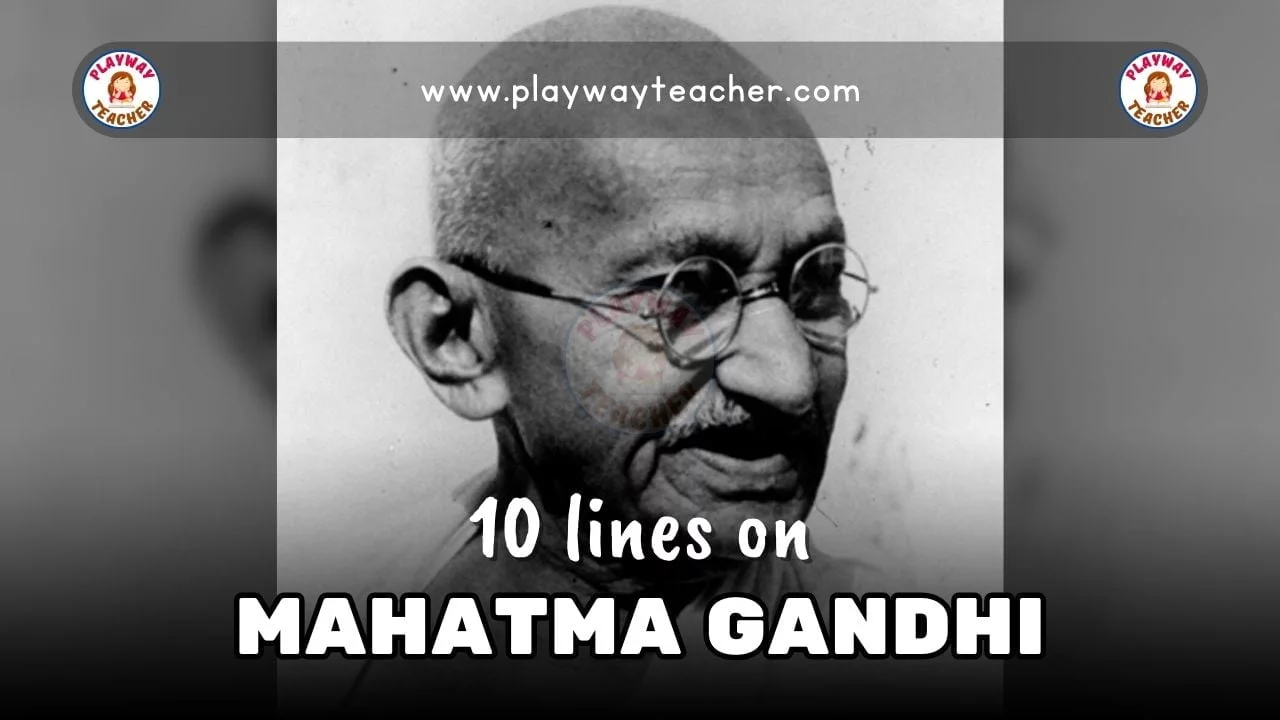
Table of Contents
10 Lines On Mahatma Gandhi For Class 1
10 lines on mahatma gandhi for class 2, 10 lines on mahatma gandhi for class 3, 10 lines on mahatma gandhi for class 4, 10 lines on mahatma gandhi for class 5, 10 lines on mahatma gandhi for class 6, our recommendations, frequently asked questions (faqs).
Welcome to Playway Teacher! In this post, we’re sharing “10 Lines on Mahatma Gandhi” for students in class 1 to class 6. Mahatma Gandhi was an important leader known for his peaceful ways and wise teachings.
Understanding Mahatma Gandhi is important for students. Our lines provide easy-to-understand information about his life and beliefs. Mahatma Gandhi taught about peace, truth, and kindness.
Students, parents, and teachers often look for few lines on Mahatma Gandhi for school projects. Our post offers accurate and age-appropriate content for children learning about him.
With our informative snippets, parents and teachers can help kids learn about Mahatma Gandhi . Let’s explore his life and ideas together in our “10 Lines on Mahatma Gandhi” series.
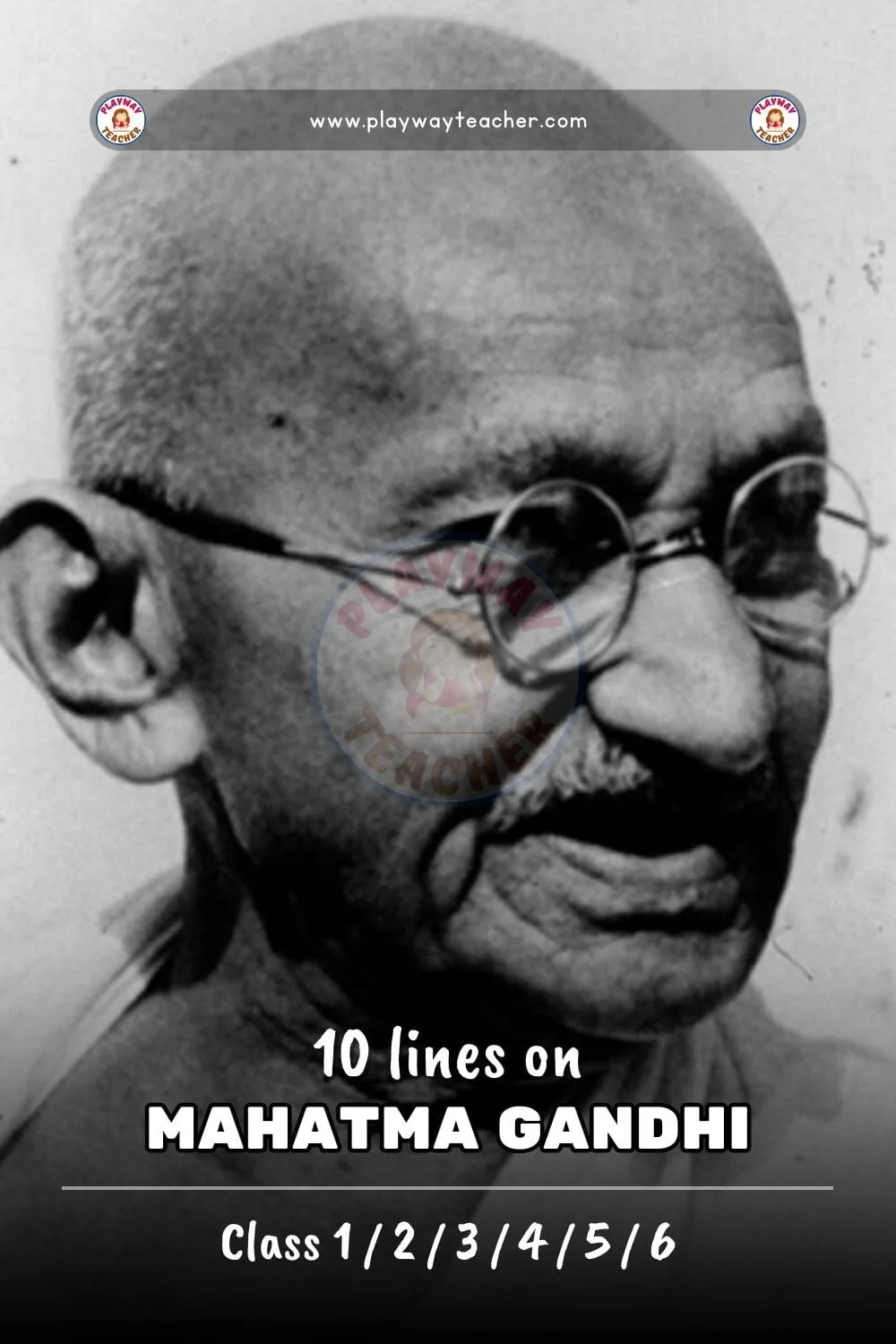
- Gandhi was a wise man.
- He liked peace and love.
- He wore simple clothes.
- People called him Bapu.
- He helped India be free.
- He spoke kind words.
- Gandhi wanted everyone to be friends.
- He believed in truth and honesty.
- We remember him with respect.
- His teachings inspire us.
- Mahatma Gandhi was a great leader.
- He wanted peace and kindness for everyone.
- Gandhi wore simple clothes and glasses.
- People called him “Bapu” with love.
- He helped India become free from British rule.
- Gandhi liked spinning cotton on a wheel.
- He taught us to be truthful and honest.
- We remember him on Gandhi Jayanti.
- His birthday is on October 2nd.
- We can learn many good things from him.
- Mahatma Gandhi fought for India’s freedom.
- He led protests without violence.
- Gandhi believed in speaking the truth always.
- He inspired many people with his words.
- Bapu lived a simple and humble life.
- Gandhi’s spinning wheel symbolized self-reliance.
- He encouraged people to live in peace.
- We celebrate Gandhi Jayanti in his honor.
- He is remembered for his kindness and love.
- Let’s follow Gandhi’s teachings of nonviolence.
Some More Topics

- Gandhi believed in Ahimsa, or nonviolence.
- He led India’s Salt March against British rule.
- Bapu practiced self-reliance and simplicity.
- Gandhi fought for India’s independence through peaceful means.
- He inspired people with his humility and wisdom.
- Mahatma Gandhi promoted unity among all religions.
- He advocated for the rights of the untouchables.
- Gandhi’s life was dedicated to serving humanity.
- He fasted to protest against injustice and inequality.
- Let’s learn from Gandhi’s teachings of love and compassion.
- Mahatma Gandhi promoted Swadeshi, or homegrown goods.
- He believed in Sarvodaya, the welfare of all.
- Gandhi advocated for women’s rights and equality.
- He practiced Brahmacharya, or self-control.
- Gandhi was imprisoned many times for his beliefs.
- He led campaigns against untouchability and caste discrimination.
- Gandhi encouraged villagers to be self-sufficient.
- He emphasized the importance of education for all.
- Gandhi’s autobiography “My Experiments with Truth” is famous.
- His spinning wheel became a symbol of self-reliance and independence.
- Mahatma Gandhi’s leadership brought about significant political change.
- He spearheaded movements against social injustices like untouchability.
- Gandhi’s belief in self-reliance empowered millions of Indians.
- Bapu’s emphasis on communal harmony promoted unity.
- He encouraged Indians to embrace indigenous industries.
- Gandhi’s life exemplified simplicity and humility.
- Bapu’s fasting became a potent tool for protest.
- He tirelessly worked towards the betterment of society.
- Gandhi’s assassination left a void in the world’s conscience.
- We commemorate his legacy through Gandhian philosophy and activism.
For Our Recommendations , we advise exploring products linked to Mahatma Gandhi . These items can assist kids, students, parents , and teachers in learning more about him.
Books about Mahatma Gandhi provide deep insights into his life and teachings. Educational books offer visual learning experiences. Also, consider posters featuring Gandhi for engaging learning tools.
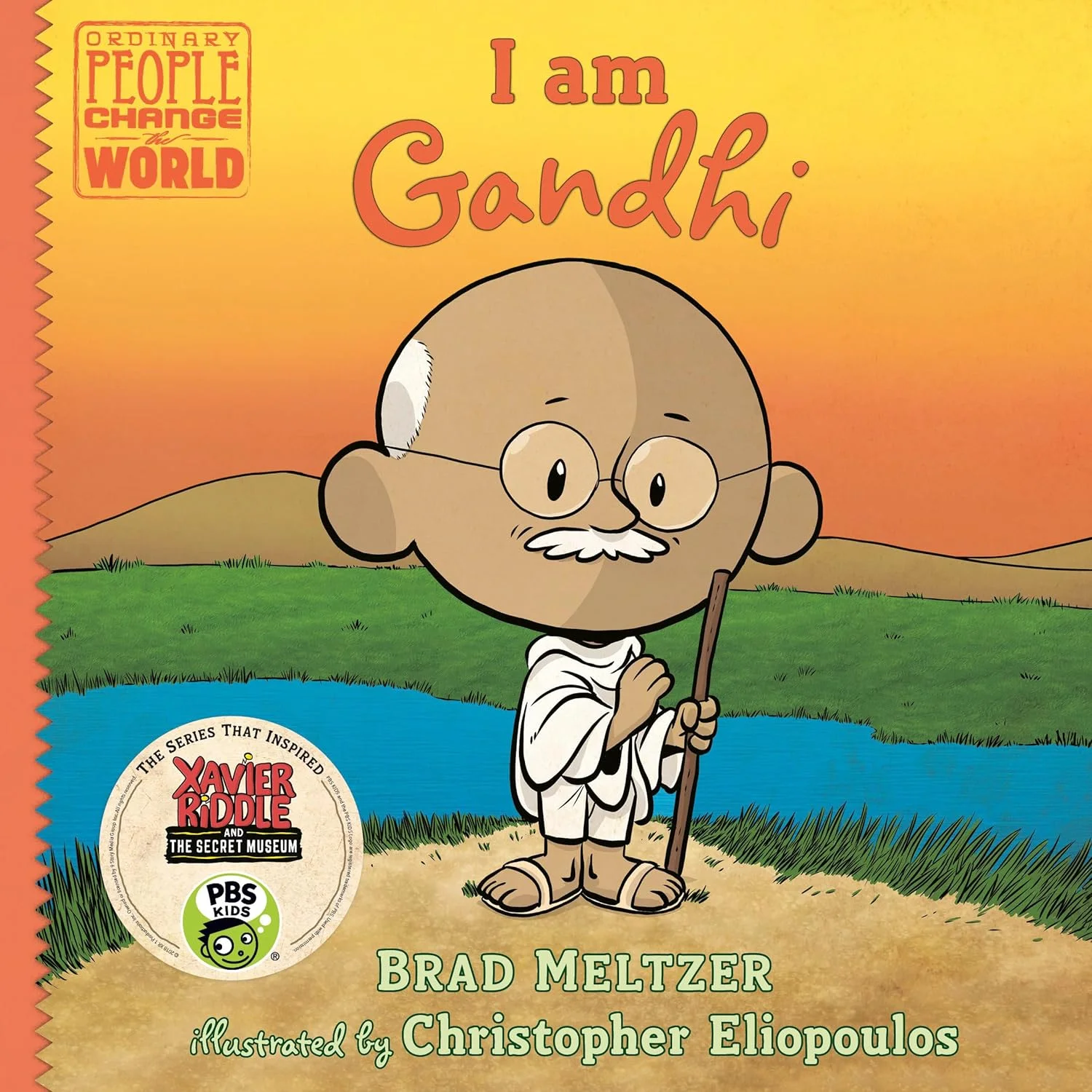
I am Gandhi

Who Was Mohandas Gandhi:The Brave Leader from India

Mahatma Gandhi Bapu Father of the NationKids Fancy Dress Costume

Handmade Clay Human Figure Gift & Decor (Mahatma Gandhi)

Soft Toys Plushona Mahatma Gandhi
In The End , we encourage you to share, like , and comment below on this informative post about 10 Lines on Mahatma Gandhi . Your engagement helps spread knowledge and inspires others.
Don’t forget to explore other enriching posts on Playway Teacher . We appreciate your time and dedication to learning. Thank you for reading this post. Click the bold like button below to show your appreciation and continue your educational journey with us.
What were Mahatma Gandhi’s main principles?
Mahatma Gandhi’s main principles were nonviolence, truth, and simplicity.
How did Mahatma Gandhi contribute to India’s independence?
Mahatma Gandhi led peaceful movements and protests against British rule, ultimately leading to India’s independence in 1947.
Why is Mahatma Gandhi often called “Father of the Nation”?
Mahatma Gandhi is called “Father of the Nation” because of his significant role in India’s independence movement and his influence on the nation’s principles.
What did Mahatma Gandhi believe in regarding clothing?
Mahatma Gandhi believed in wearing simple and homemade clothes as a symbol of self-reliance and resistance to British-made goods.
How did Mahatma Gandhi promote his principles?
Mahatma Gandhi promoted his principles through nonviolent protests, fasting, and advocating for social reforms such as equality and justice for all.
What significant event did Mahatma Gandhi lead in 1930?
Mahatma Gandhi led the Salt March in 1930 to protest against the British salt tax, which sparked widespread civil disobedience across India.
How did Mahatma Gandhi’s teachings influence other leaders?
Mahatma Gandhi’s teachings of nonviolence and civil disobedience influenced other leaders like Martin Luther King Jr. and Nelson Mandela in their fights against oppression.
What is the significance of Mahatma Gandhi’s birthday, October 2nd?
Mahatma Gandhi’s birthday, October 2nd, is celebrated as Gandhi Jayanti and observed as the International Day of Nonviolence to honor his legacy.
What role did Mahatma Gandhi play in the fight against discrimination?
Mahatma Gandhi fought against discrimination based on caste, religion, and gender, advocating for equal rights and dignity for all individuals.
How is Mahatma Gandhi remembered today?
Mahatma Gandhi is remembered today for his lasting impact on the world through his teachings of peace, truth, and nonviolence, inspiring people to strive for a better and more just society.
Was this helpful?
Please note that the information provided here is for educational purposes only. Always verify facts from reliable sources before using them in academic work. Additionally, this post may contain Amazon affiliate links and Google Ads, which means we may earn a small commission if you purchase through these links. This helps support the site at no extra cost to you. Read our full disclosure here .

Your email address will not be published. Required fields are marked *

Essay on Mahatma Gandhi [100, 150, 200, 300, 500 Words]
Essay on Mahatma Gandhi in English: In this article, you are going to read short and long essays on Mahatma Gandhi in English (100, 150, 200-250, 300, and 500 words). This article will be also helpful for you If you are looking for a speech on Mahatma Gandhi or Paragraph on Mahatma Gandhi in English. We’ve written this article for students of all classes (nursery to class 12). So, let’s get started.
Table of Contents
Short Essay on Mahatma Gandhi 100 Words
Mahatma Gandhi was one of the greatest leaders of our country. He was born in Porbandar, India, on October 2, 1869. His father Karamchand Gandhi was the Dewan and his mother Putlibai was a pious lady. Gandhiji went to England to become a barrister. In 1893 he went to South Africa and worked for the rights of our people.
He returned to India in 1915 and joined the freedom struggle. He started many political movements like Non-cooperation movement, Salt Satyagraha, Quit India Movement to fight against the British. Gandhiji worked for the ending of the caste system and the establishment of Hindu-Muslim unity. He was killed by Nathuram Godse On January 30, 1948.
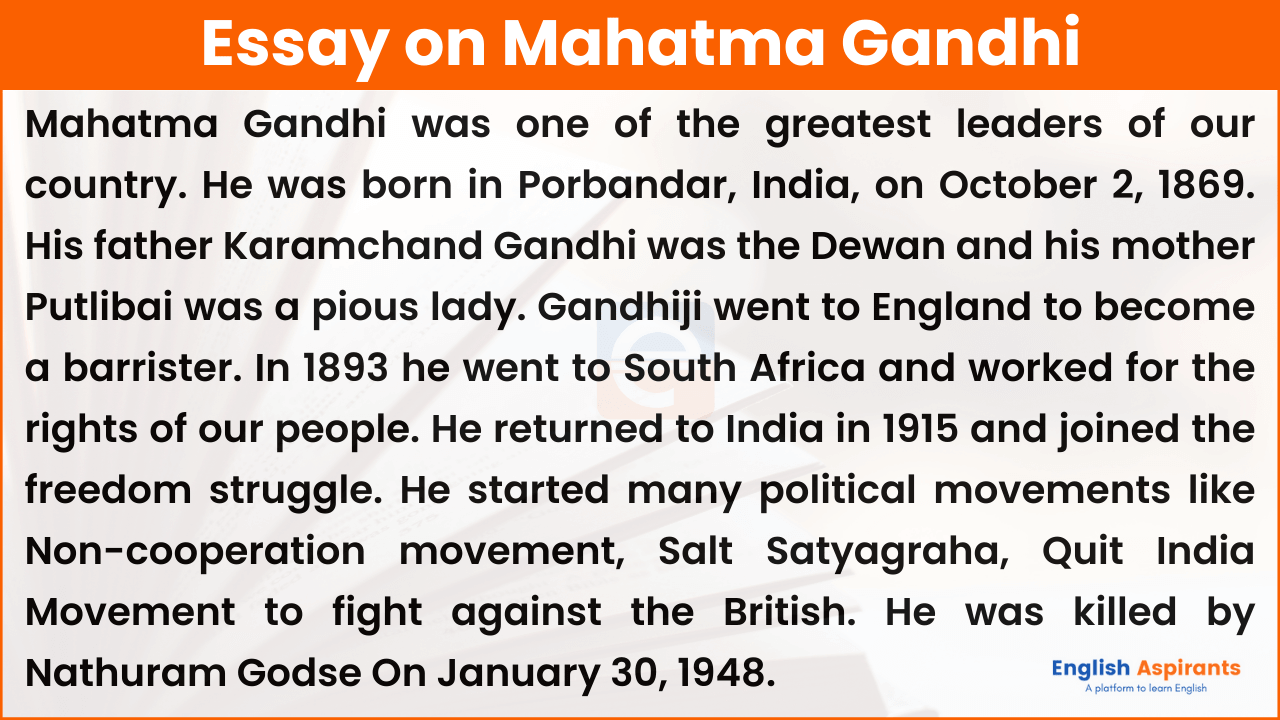
Mahatma Gandhi Essay in English 150 Words
Mahatma Gandhi was a great leader. His full name was Mohandas and Gandhi. He was born on October 2, 1869 at Porbandar. His father was a Diwan. He was an average student. He went to England and returned as a barrister.
In South Africa, Gandhiji saw the bad condition of the Indians. There he raised his voice against it and organised a movement.
In India, he started the non-cooperation and Satyagraha movements to fight against the British Government. He went to jail many times. He wanted Hindu-Muslim unity. In 1947, he got freedom for us.
Gandhiji was a great social reformer. He worked for Dalits and lower-class people. He lived a very simple life. He wanted peace. He believed in Ahimsa.
On January 30, 1948, he was shot dead. We call him ‘Bapu’ out of love and respect. He is the Father of the Nation.
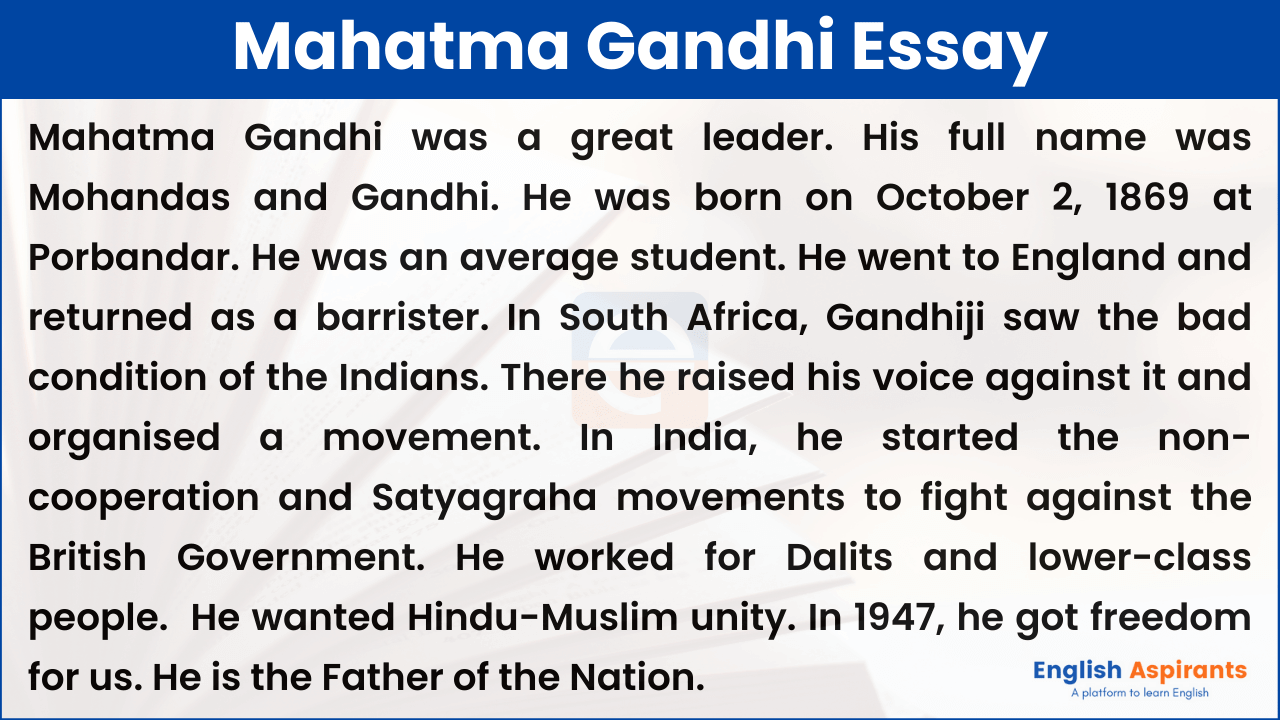
Also Read: 10 Lines on Mahatma Gandhi
Essay on Mahatma Gandhi 200-250 Words
Mohandas Karamchand Gandhi, popularly known as Mahatma Gandhi was an Indian lawyer, freedom activist, and politician. Gandhiji was born on October 2, 1869 at Porbandar, Gujarat. His father Karamchand Gandhi was the Chief Minister (diwan) of Porbandar state. His mother Putlibai was a religious woman.
He went to England to study law at the age of 18 years. After his return to India, he started a practice as a lawyer in the Bombay High Court. He went to South Africa and started practicing law. There he protested against the injustice and harsh treatment of the white people towards the native Africans and Indians.
He returned to India in 1915 and started to take interest in politics. Mahatma Gandhi used the ideals of truth and non-violence as weapons to fight against British colonial rule. He worked for the upliftment of Harijans. He fought against untouchability and worked for Hindu-Muslim unity.
Through his freedom movements like Non-cooperation movement, Khilafat movement, and civil disobedience movement he fought for freedom against the British imperialists. 1942, he launched the Quit India movement to end the British rule. At last, India got freedom in 1947 at his initiative.
People affectionately call him ‘Bapu’ and the ‘Father of the Nation’. He was shot dead in 1948 by the Hindu fanatic Nathuram Godse. Gandhiji’s life is a true inspiration for all of us.
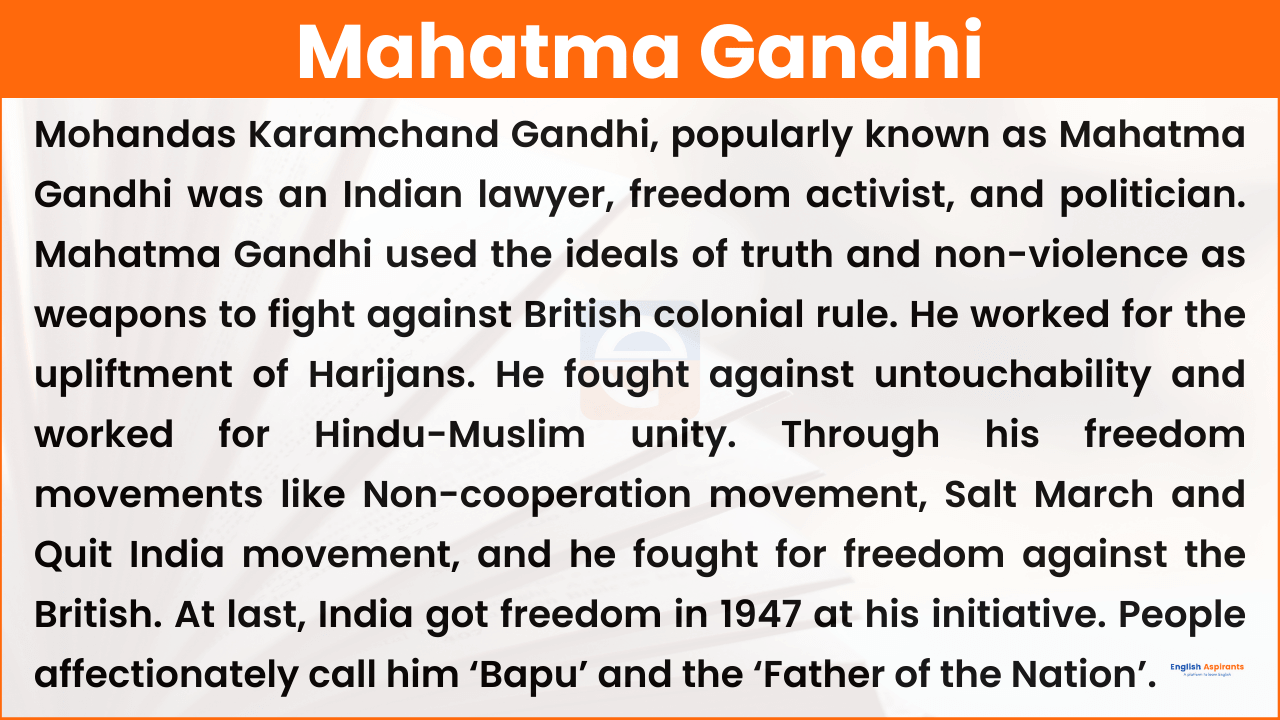
Mahatma Gandhi Essay in English 300 Words
Mahatma Gandhi was born at Porbandar in Gujarat on 2nd October, 1869. His father was the Diwan of the State. His name was Karam Chand Gandhi. Mahatma Gandhi’s full name was Mohan Das Karamchand Gandhi. His mother’s name was Putali Bai. Mahatma Gandhi went to school first at Porbandar then at Rajkot. Even as a child, Mahatma never told a lie. He passed his Matric examination at the age of 18.
Mohan Das was married to Kasturba at the age of thirteen. Mahatma Gandhi was sent to England to study law and became a Barrister. He lived a very simple life even in England. After getting his law degree, he returned to India.
Mr. Gandhi started his law practice. He went to South Africa in the course of a law suit. He saw the condition of the Indians living there. They were treated very badly by the white men. They were not allowed to travel in 1st class on the trains, also not allowed to enter certain localities, clubs, and so on. Once when Gandhiji was travelling in the 1st class compartment of the train, he was beaten and thrown out of the train. Then Mahatma decided to unite all Indians and started the Non-violence and Satyagrah Movement. In no time, the Movement picked up.
Mahatma Gandhi returned to India and joined Indian National Congress. He started the Non-violence, Non-cooperation Movements here also. He travelled all over India, especially the rural India to see the conditions of the poor.
Mahatma Gandhi started Satyagrah Movement to oppose the Rowlatt Act and there was the shoot-out at Jalian-Wala-Bagh. The Act was drawn after many people were killed. He then started the Salt Satyagraha and Quit India Movements. And finally, Gandhiji won freedom for us. India became free on 15th August, 1947. He is called as “Father of the Nation”. Unfortunately, Gandhiji was shot on 30 January 1948 by a Hindu extremist Nathuram Godse.
Also Read: Gandhi Jayanti Speech 10 Lines
Mahatma Gandhi Essay in English 500 Words
Introduction:.
Mohandas Karamchand Gandhi, popularly known as Mahatma Gandhi was a politician, social activist, writer, and leader of the Indian national movement. He is a figure known all over the world. His name is a household word in India, rather, in all the world round. His creed of non-violence has placed him on the same par with Buddha, Sri Chaitanya, and Jesus Christ.
Family & Education:
Mahatma Gandhi was born in the small town of Porbandar in the Kathiwad state on October 2, 1869. His father Karamchand Gandhi was the prime minister of Rajkot State and his mother Putlibai was a pious lady. Her influence shaped the future life of Mahatma Gandhi.
He was sent to school at a very early age, but he was not a very bright student. After his Matriculation Examination, he went to England to study law and returned home as a barrister. He began to practice law in Bombay but he was not very successful.
Life in South Africa:
In 1893 Gandhiji went to South Africa in connection with a case. He found his own countrymen treated with contempt by the whites. Gandhiji started satyagraha against this color hated. It was a non-violent protest, yet hundreds were beaten up and thousands were sent to jail. But Gandhiji did not buzz an inch from his faith in truth and non-violence and at last, he succeeded in his mission. He was awarded the title of Mahatma.
Fight for India’s Independence:
In 1915 Gandhiji came back to India after twenty long years in South Africa. He joined the Indian National congress and championed the cause of India’s freedom movement. He asked people to unite for the cause of freedom. He used the weapons of truth and non-violence to fight against the mighty British.
The horrible massacre at Jalianwalabag in Punjab touched him and he resolved to face the brute force of the British Government with moral force. In 1920 he launched the Non-cooperation movement to oppose British rule in India.
He led the famous Dandi March on 12th March 1930. This march was meant to break the salt law. And as a result of this, the British rule in India had already started shaking and he had to go to London for a Round Table Conference in 1931. But this Conference proved abortive and the country was about to give a death blow to the foreign rule.
In 1942 Gandhiji launched his final bout for freedom. He started the ‘Quit India’ movement. At last, the British Government had to quit India in 1947, and India was declared a free country on August 15, 1947.
Social Works:
Mahatma Gandhi was a social activist who fought against the evils of society. He found the Satyagraha Ashram on the banks of the Sabarmati river in Gujarat. He preached against untouchability and worked for Hindu-Muslim unity. He fought tirelessly for the rights of Harijans.
Conclusion:
Mahatma Gandhi, the father of the nation was a generous, god-loving, and peace-loving person. But unfortunately, he was assassinated by Nathuram Godse on 30th January 1948 at the age of 78. To commemorate Gandhiji’s birth anniversary Gandhi Jayanti is celebrated every year on October 2. Gandhiji’s teachings and ideologies will continue to enlighten and encourage us in the future.
Read More: 1. Essay on Swami Vivekananda 2. Essay on Subhash Chandra Bose 3. Essay on Mother Teresa 4. Essay on APJ Abdul Kalam 5. Essay on Sarvepalli Radhakrishnan
Related Posts
Apj abdul kalam essay in english | 100, 200, 300, 500 words, blood donation essay in english | 150, 200, 300 words, my mother essay in english 10 lines [5 sets], essay on mother teresa in english for students [300 words], leave a comment cancel reply.
Your email address will not be published. Required fields are marked *
Save my name, email, and website in this browser for the next time I comment.
- Skip to main content
India’s Largest Career Transformation Portal
10 Lines on Mahatma Gandhi
January 20, 2022 by Sandeep
Mahatma Gandhi is a prominent figure in India’s history. He inspired and led thousands of Indians to fight for their independence during the British colonial rule. He had a great influence on both Indians and the British. He actively shouldered long fasts as an act of protest and self-purification in the British’s face. He fought for the civil rights of Indians and South Africans. His sacrifice and leadership impacted the native Indians to drive towards the independence of 1947 and finally call their land their own.
Ten Lines on Mahatma Gandhi
- Mahatma Gandhi was born on the 2nd of October, 1869, to an Indian Gujarati family.
- He completed his primary and secondary education from two schools in Rajkot.
- He got married to Kasturbai Makhanji Kapadia at the age of 13.
- On September 4th, 1888, Gandhi left India to pursue a degree in Law in London.
- In 1893 he left for South Africa to practice law and spent 21 years there.
- Gandhi met with a lot of prejudice there, which led him to fight for their civil rights and establish the Natal Indian Congress in 1894.
- He fought alongside the South Africans against the Apartheid movement and later established a community preaching ‘peaceful resistance’.
- He was appointed the leader of the Indian National Congress in 1920 and led the men to struggle for India’s independence.
- In 1942, Gandhi and all the resistors were imprisoned.
- After a lot of struggle, the Muslim League agreed to a separate Muslim country, Pakistan, and independence of both India and Pakistan was achieved in August 1947.
- Mahatma Gandhi was an Indian Nationalist activist a renowned freedom fighter.
- His full name is Mohandas Karamchand Gandhi, and he was born in a Hindu family in Porbandar, India.
- Gandhi was an average student, and he dropped out of Samaldas College and went on to pursue law in London in 1888.
- His failed attempts to practice law in India led him to South Africa, where he fought against discrimination and prejudices against Indians.
- After the break out of the Zulu war in 1906, Gandhi, with 20 other men, acted as nurses and treated the wounds of the victims.
- He came back to India in 1915 and was introduced to the Indian National Congress by Gopal Krishna Gokhale. Gandhi launched the Non-Cooperation movement in 1919 and urged his countrymen to rebel by boycotting all the British goods-
- ‘Swadeshi Policy’, and take upon ‘Swaraj’ or self-rule.
- Due to the ‘Khilafat Movement’, his co-operation with the Muslim communities also fell around this time.
- Nevertheless, Gandhi and his followers continued maintaining Swaraj, which ultimately led to the independence of Lahore on December 31st, 1929.
- Gandhi had plenty of enemies due to his popularity, and he was murdered by a Hindu nationalist on January 30th, 1948.
- Mohandas Karamchand Gandhi was born on October 2nd, 1869, to a Hindu Gujarati family, in a coastal town of Kathiawar Peninsula.
- His father was Karamchand Uttamchand Gandhi, and his mother was Putlibai, Karamchand’s fourth wife.
- Gandhi was the youngest of their four children and had five siblings.
- He got married to Kasturbai Makhanji Kapadia in 1883, who gave birth to four children.
- He got his Law degree from University College, London, and later went to South Africa to practice law.
- Gandhi fought for the rights of Indians after returning to India in 1915.
- He gave birth to and led a lot of movements such as ‘Non-Cooperation’ (1919), ‘Quit India’ (1942), and the Champaran Agitation in Bihar (1917).
- He was arrested countless times on several charges, but the support of the people brought him back.
- Such was his influence that people from all over the country came to meet with him and join him on his Salt Satyagraha (Dandi March) against the imposition of tax on salt in 1930.
- This inspirational figure, who was affectionately called ‘Bapu,’ was killed due to three bullet wounds fired by Nathuram Godse in 1948, at the age of 78.

10 Lines on Mahatma Gandhi for Children and Students
10 Lines on Mahatma Gandhi : Mahatma Gandhi real name was Mohandas Karamchand Gandhi. he became a Mahatma by virtue of his good work. People lovingly called him Bapuji or Mahatma Gandhi.
He started many important movements like civil rights movement, Dandi March, quit India movement etc. He worked for the unity of nation and remove the problem of untouchability under his leadership. At Last India got freedom on 14 August 1947. His message will always a guide for our nation. Mahatma Gandhi is the father of our nation.
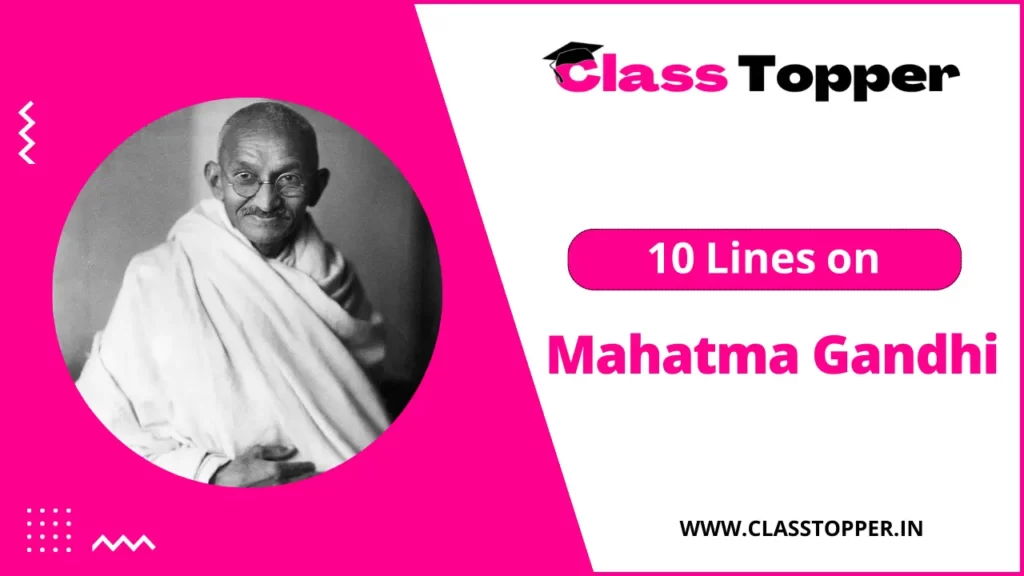
Table of Contents
10 Lines on Mahatma Gandhi for Kids
Pattern 1 – This 10 Lines is very helpful for classes 1, 2, 3, 4, 5, 6, 7, 8, to College Students.
- Mahatma Gandhi was born on 2nd October 1869.
- His mother’s name was putuli Bai.
- His father’s name was kaba Gandhi.
- He got married to Kasturba.
- Mohandas Karamchand Gandhi was his full name.
- He loved truth very much.
- He started non- violent struggle for the freedom of our country.
- He passed matriculation in 1887.
- Mahatma Gandhi went to jail several times.
- Nathuram godsay shot him dead.
10 Lines on Mahatma Gandhi for Students
Pattern 2 – This 10 Lines is very helpful for classes 8, 9, 10, 11, 12th and Higher Class Students.
- Mahatma Gandhi was a great and powerful leader of India.
- He was born at Porbandar in Gujarat on 2nd October 1869.
- His full name was Mohandas Karamchand Gandhi.
- Gandhiji is also known as bapu and father of the nation.
- His birthday is celebrated every year as Gandhi jayanti.
- He studied law in ingland. Gandhiji believed in truth.
- At the age of 13 Mohandas Karamchand Gandhi was married to Kasturba.
- His father kaba Gandhi was the Dewan of kathiawad in Rajkot.
- His mother putuli Bai was a pious lady.
- He studied law and came back to India as a barrister.
- He taught gymnastics had nothing to do with education.
- He was shot dead on January 30, 1948.
Read other related post– Short Essay / 10 Lines .
Feel free to leave any related questions or suggestions in the comments section below. Your feedback is valuable to us! If you find this information interesting, don’t hesitate to share it with your friends who might also enjoy reading it. Sharing is caring!
References Links:
- https://en.wikipedia.org/wiki/Mahatma_Gandhi
- https://www.britannica.com/biography/Mahatma-Gandhi
- https://www.bl.uk/people/mahatma-gandhi
You must be logged in to post a comment.
- School Guide
- CBSE Notes for Class 8
- CBSE Notes for Class 9
- CBSE Notes for Class 10
- CBSE Notes for Class 11
- CBSE Notes for Class 12
- NCERT Solutions
- English Grammar
- Basic Maths Formulas
500+ Words Essay on Mahatma Gandhi in English
- 500+Words Essay on My Hobby in English
- Essay on My Father in English: 300, 500 & 800 Words Essay
- 500+ Words Essay on Importance of Education in English
- 500+ Words Essay on Newspaper in English For Students
- 500+ Words Essay on Swami Vivekananda in English for Students
- Essay on Science in English: Check 200, 300 & 500 Words Essay
- Essay on My Family: Short, 10 Lines, 100 Words Essay
- Why did Mahatma Gandhi Think that English Education had Enslaved Indians?
- Role of Mahatma Gandhi in Freedom Struggle
- 70+ New Words in English With Their Meaning
- Essay on my Best Friend: 10 Lines, 100 Words, 200 Words Essay
- Pandit Jawaharlal Nehru Essay in English For Students
- Rabindranath Tagore Essay in English For Students
- Essay on My Mother: 10 lines, 100 Words and 200 words essay
- Subhash Chandra Bose Essay in English: Check 100, 200, 300 Words Essay
- Features of Mahatma Gandhi National Rural Employment Guarantee Act 2005
- Essay on My Favourite Teacher (10 Lines, 100 Words, 200 Words)
- Constructive Programmes of Mahatma Gandhi
- Role of Mahatma Gandhi in National Movement
Mahatma Gandhi was one of the most important freedom fighters who played a major role in India’s freedom struggle. His ideologies of ahimsa and satyagraha brought the Mighty British Empire on its keens, ultimately making India an independent country. His efforts to make India an independent and self-reliant country earned him the title of ‘The Father of Nation’. Every year, we celebrate his birthday on 2nd October as Gandhi Jayanti, where we recall his ideas of ahimsa, women empowerment, satyagraha, etc.
Essay on Mahatma Gandhi is a popular academic topic, assigned to students. To score better marks in an essay on Mahatma Gandhi, you must cover all dimensions of his life; his early life, profession, ideals, national movements, etc. On this page, we will provide you with an essay on Mahatma Gandhi in 500 words.
Essay on Mahatma Gandhi in 500 Words
‘Mahatma Gandhi was born on 2nd October 1869 in Porbandar, Gujarat. His real name was ‘Mohandas Karamchand Gandhi. At 18, Gandhi sailed from Bombay to London, where he attended the University College, London. Gandhi also had the intention of becoming a Barrister, so he enrolled at the Inns of Court School of Law in Inner Temple. In London, Gandhi joined a public speaking group to enhance his communication and English speaking skills.
Civil Rights in South Africa
At the age of 22, Gandhi completed his law degree and left for India. The next year, a Muslim merchant in Katiawar contacted Gandhi, to solve a legal problem in their sipping business in Johannesburg, South Africa. Gandhi spent 23 years of his life in South Africa, where he initially protected the interest of the Muslim merchant and then against skin color discrimination.
Gandhi was not allowed to sit with the European passengers, and if he resisted, he was beaten, kicked into a gutter, and thrown off a running train. Gandhi found this very humiliating and could not understand how people felt honoured by such inhuman practices. In South Africa, Gandhi fought for the voting rights of the Indians and Africans. He helped establish a political organization, the Natal Indian Congress. He prepared a legal brief in 1895 to seek voting rights for Indians. To gain the support of Africans, Gandhi, along with his colleagues, helped the Africans as nurses by opposing racism.
It was in South Africa where Gandhi established his newspaper, named Indian Opinion to share his ideas with the African Indian Community. In 1910, In 1910, he established an idealistic community named Tolstoy Farm near Johannesburg. It was these developments which helped the black South Africans to gain voting rights and Mahatma Gandhi was declared a National Hero.’
Return to India
‘On 9th January 1915, Mahatma Gandhi returned to India from South Africa. Before his arrival, he already become a nationalist figure. Upon his arrival in India, Gandhi took a nationwide tour, where he witnessed chaos and disorder everywhere. He declared Gopa Krishna Gokhale as his Political Guru.
Mahatma Gandhi started his nationalist moments with the Champaran Satyagraha in 1917, the Kheda Satyagraha and the Ahmedabad Mill Strike in 1918. Then came the Khilafat Movement, where he tried to unite the Hindus and Muslims.
Gandhi, in his book ‘Hind Swaraj’, wrote that the British rule in India was the result of Indian cooperation. He said that if the Indian masses refused to co-operate, the British rule would come to an end and India would become a free and independent nation. Therefore, he launched the Non-Cooperation Movement in 1920. After this movement, India was sentenced to 6 years of imprisonment.
Other important movements by Gandhiji were the Civil Disobedience and the Quit India Movement. Gandhi believed in religious pluralism. It was his and his fellow India’s undying efforts which led to India’s independence on 15th August 1947.’
‘Gandhiji’s ideas of nonviolence, peaceful satyagraha, self-reliance, simple living and religious tolerance earned him fame not only in India but from other countries also. His ideals inspired the American Civil Rights Movement in the 1950s and 60s. His ideals have inspired the whole world to live in peace.’
10 Lines on Mahatma Gandhi
Here are 10 lines on Mahatma Gandhi. Students can add them to their essays on Mahatma Gandhi or similar writing topics.
1. Mahatma Gandhi’s birth anniversary is annually celebrated as Gandhi Jayanti on 2nd October.
2. Mahatma Gandhi was an important Indian freedom fighter.
3. He promoted the principle of nonviolence, or ‘ahimsa,’ as a powerful force for change.
4. Gandhi’s philosophy of ‘satyagraha’ emphasized the transformative power of truth and moral courage.
5. Mahatma Gandhi was a lawyer by profession.
6. Gandhi believed in economic self-reliance, encouraging the use of local products and cottage industries.
7. His life reflected a commitment to simple living and a rejection of materialism.
8. Religious tolerance was a core value for Gandhi, who championed the unity of all faiths.
9. Gandhi favoured the decentralization of political and economic power for community empowerment.
10. Gandhiji believed that education can help in character building and moral development.
10 Popular Quotes to Add in Essay on Mahatma Gandhi
Here are 10 popular quotes by Mahatma Gandhi.
1. ‘Be the change that you wish to see in the world.’
2. ‘The best way to find yourself is to lose yourself in the service of others.’
3. ‘You must be the change you want to see in the world.’
4. ‘An eye for an eye only ends up making the whole world blind.’
5. ‘The weak can never forgive. Forgiveness is the attribute of the strong.’
6. ‘Live as if you were to die tomorrow. Learn as if you were to live forever.’
7. ‘Happiness is when what you think, what you say, and what you do are in harmony.’
8. ‘First, they ignore you, then they laugh at you, then they fight you, then you win.’
9. ‘Freedom is not worth having if it does not include the freedom to make mistakes.’
10. ‘The greatness of a nation and its moral progress can be judged by the way its animals are treated.’
Similar Read Holi Essay 2024 for Students in English: Short Essay on Holi Essay on My Family: Short, 10 Lines, 100 Words Essay 500+ Words Essay on Swami Vivekananda in English for Students 500+ Words Essay on Mother Teresa in English For Students APJ Abdul Kalam Essay For Students: Check 500 Words Essay
Essay on Mahatma Gandhi- FAQs
What is the short essay on mahatma gandhi.
‘Mahatma Gandhi was born on 2nd October 1869 in Porbandar, Gujarat. His real name was ‘Mohandas Karamchand Gandhi. He was one of the most influencial figure of the 20th century and his contributions made India an independent country. Mahatma Gandhi was known for his ideals and peaceful philosophies, such as non-violence, religious tolerance, self-reliant, etc. He led various nationalised movements, like the Champaran Satyagraha, Non Cooperation Movement, Civil Disoobedience and Quit India Movements.
What are some popular quotes by Mahatma Gandhi?
Some of the popular quotes by Gandhiji are: ‘Be the change that you wish to see in the world.’ ‘The best way to find yourself is to lose yourself in the service of others.’ ‘You must be the change you want to see in the world.’ ‘An eye for an eye only ends up making the whole world blind.’ ‘The weak can never forgive. Forgiveness is the attribute of the strong.’ ‘Live as if you were to die tomorrow. Learn as if you were to live forever.’
What do you know about Mahatma Gandhi’s 10 important points?
Gandhiji was a peace lover. He believed in religious tolerance. He wanted to unite all religions and castes of India. He was a lawyer by profession. His efforts led to India’s independence. Gandhi believed in economic self-reliance, encouraging the use of local products and cottage industries. His life reflected a commitment to simple living and a rejection of materialism. Religious tolerance was a core value for Gandhi, who championed the unity of all faiths.
What are the names of books written by Mahatma Gandhi?
Some of the books written by Mahatma Gandhi are: The Story of My Experiments With Truth, Hind Swaraj or Indian Home, The Words of Gandhi, India of My Dreams, etc.
When did Mahatma Gandhi arrive in India from South Africa?
Mahatma Gandhi arrived in India from South Africa on 9th January 1915. 9th January is also celebrated as Pravasi Bharatiya Diwas every year.
This was all about an essay on Mahatma Gandhi. We hope this essay was able to cover all the dimensions of the given topic. For more information on such informative essay topics, visit GeekforGeeks.
Please Login to comment...
Similar reads.
- Essay Writing
- school blogs
- School English
Improve your Coding Skills with Practice
What kind of Experience do you want to share?
- Latest Education News
- Engineering
- Law Admission
- Design Admission
- PG Admission
- Preparation Guide
- Entrance Exam Results
- Board Exam Results
- UPSC Civil Services 2025
- NDA 2024 (I & II)
- SSC Recruitment
- Railway Recruitment
- Board Time Table
- Bihar Board (BSEB)
- Chhattisgarh Board
- Gujarat Board
- Haryana Board
- Course Guides

Essay on Mahatma Gandhi in 500 Words (English)- Short Essay
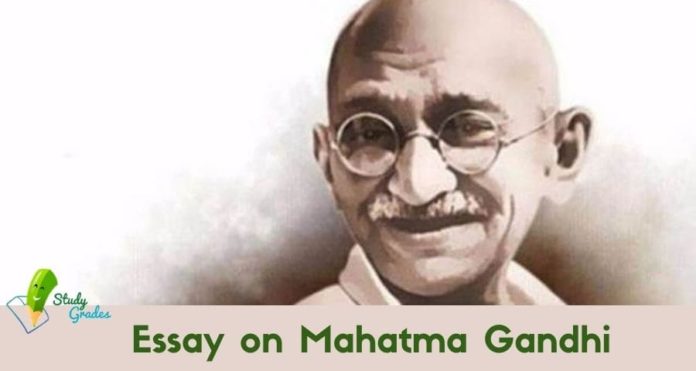
Essay on Mahatma Gandhi in English- Students from Class 1 to 12 search for a short essay on Mahatma Gandhi to complete their assignment or homework. Most of the times the common question in the term examinations is to write a Mahatma Gandhi essay in English in 500 words . Here, we have provided a 500 words essay on Mahatma Gandhi so that students can make a good compiling short essay about Mahatma Gandhi to get good marks in final exams. Students can get the idea on how to phrase the words to make a good essay on Mahatma Gandhi in 500 words. Below is the essay about Mahatma Gandhi.
Essay on Mahatma Gandhi in 250 words
Mahatma Gandhi, born on October 2, 1869, in Porbandar, Gujarat, India, was a preeminent leader of the Indian independence movement against British colonial rule. Known for his philosophy of nonviolent resistance, Gandhi became a symbol of peace, truth, and justice.
Gandhi’s early life was marked by his experiences in South Africa, where he developed his principles of Satyagraha (truth force) and Ahimsa (nonviolence) while fighting against racial discrimination. Upon returning to India in 1915, Gandhi emerged as a prominent leader in the struggle for independence.
Gandhi’s approach to activism was rooted in nonviolent protest and civil disobedience. He led numerous campaigns and movements, including the Salt March in 1930, where he and his followers marched to the Arabian Sea to protest the British salt monopoly. Through his leadership and principles, Gandhi inspired millions of Indians to join the freedom struggle.
Despite facing imprisonment and persecution, Gandhi remained steadfast in his commitment to nonviolence and truth. He advocated for the rights of the oppressed, including the untouchables or Dalits, and promoted communal harmony and religious tolerance.
Gandhi’s efforts culminated in India’s independence from British rule on August 15, 1947. However, his vision of a united, secular, and peaceful India was marred by the partition of the country into India and Pakistan, leading to widespread violence and displacement.
Even after independence, Gandhi continued to advocate for social justice and equality. However, his life was tragically cut short when he was assassinated by a Hindu extremist on January 30, 1948.
Mahatma Gandhi’s legacy remains a source of inspiration for people around the world. His principles of nonviolence, truth, and compassion continue to guide movements for peace, justice, and human rights globally. Gandhi’s life and teachings remind us of the power of love, tolerance, and the pursuit of truth in the face of adversity.
Essay on Mahatma Gandhi in 500 Words (English)
Mahatma Gandhi, popularly known as Father of Nation, plays a vital role in the Independence struggle of India. His full name was Mohandas Karamchand Gandhi. With his dedication and determination, he successfully led many freedom movements in India. He is majorly known for his “Dandi March”, also called as Salt Satyagraha, held from March 12, 1930 to April 6, 1930. It was a 24-days march starting from Sabarmati Ashram to Dandi. In the era of violence, he supported the non-violence freedom movements. He was a great patriotic leader with an unbelievably attractive personality. His contributions in India’s independence is unforgettable.
Background of Mahatma Gandhi
Mohandas Karamchand Gandhi was born on October 2, 1869 in a Gujarati family. His birthplace is Porbandar (also known as Sudamapuri). He is the fourth and youngest son of Karamchand Gandhi and Putlibai. He has 2 elder brothers and 1 sister. At the age of 13 years, Mohandas Gandhi was married to a 14-year-old girl, Kasturbai Makhanji Kapadia. Mohandas and Kasturba had four sons: Harilal, Manilal, Ramdas, and Devdas.
Mahatma Gandhi Education
Mahatma Gandhi studied law from London and returned to India in June 1891. After his inability to cross-examine witnesses, he moved to South Africa to be a lawyer. During his 21 years of stay in South Africa, he developed political views.
Achievements of Mahatma Gandhi
Mahatma Gandhi received innumerable awards and recognition. However, people know only a few. Some of the main achievements are mentioned here.
- Because of his continuous struggle, he successfully contributed in eliminating the British rule from India in 1947.
- Gandhi received the Queen’s South Africa Medal along with thirty-seven other Indians.
- Teachings of Mahatma Gandhi were appreciated and followed by many popular leaders including Martin Luther King Jr and Nelson Mandela.
- Honoring Mahatma Gandhi, UN celebrates October 2 as “the International Day of Nonviolence.” Also, many countries observe January 30 as the School Day of Nonviolence and Peace.
Mahatma Gandhi Death
Mahatma Gandhi was assassinated on January 30, 1948 by Nathuram Godse.
Conclusion – Mahatma Gandhi is remembered as the Father of Nation because of his unforgettable contribution in the freedom of India. He has devoted his entire life to the nation.
Short Essay on Mahatma Gandhi
Mahatma Gandhi, also known as the Father of the Nation in India, was a prominent leader of the Indian independence movement against British rule. Born on October 2, 1869, in Porbandar, Gujarat, Gandhi led India to independence through his philosophy of nonviolent resistance, Satyagraha.
Gandhi’s life was characterized by simplicity, humility, and a steadfast commitment to truth and nonviolence. He advocated for social justice, equality, and the rights of marginalized communities, including the untouchables or Dalits.
Through his principles of ahimsa (nonviolence) and civil disobedience, Gandhi inspired millions of people to join the freedom struggle. His leadership and teachings galvanized the nation and eventually led to India’s independence from British colonial rule on August 15, 1947.
Gandhi’s legacy extends far beyond India’s independence. His philosophy of nonviolence and Satyagraha influenced many other civil rights movements around the world, including the American civil rights movement led by Martin Luther King Jr.
Despite facing numerous challenges and enduring hardships, Gandhi remained committed to his principles and never wavered in his pursuit of truth and justice. His life and teachings continue to inspire generations of people to strive for peace, equality, and social harmony.
Mahatma Gandhi’s contributions to the world will always be remembered, cherished, and celebrated as a beacon of hope and inspiration for humanity. His message of love, compassion, and nonviolence remains as relevant today as it was during his lifetime.
10 Lines on Mahatma Gandhi
- Mahatma Gandhi is known as “Father of Nation”, commonly called as Bapu.
- He was born on October 2, 1869 in Porbandar, Gujarat.
- His full name was Mohandas Karamchand Gandhi.
- Mohandas was married to Kasturbai Makhanji Kapadia, commonly known as Kasturba Gandhi.
- His birthday is celebrated as Gandhi Jayanti in India and International Day of Nonviolence worldwide.
- Mahatma was a law graduate and worked as Civil rights activist in South Africa (1893–1914)
- He wrote several books including his autobiography, The Story of My Experiments with Truth, Satyagraha in South Africa.
- Mahatma Gandhi was an integral part of India’s independence. He followed the path of non-violence to eliminate the rule of Britishers in India.
- He initiated several movements that lead to including Champaran agitation in Bihar (1917), Kheda Satyagraha (1918), Khilafat movement (1919), Salt Satyagraha or Dandi March (1930).
- In 1930, Time magazine named Gandhi the Man of the Year.
- Nathuram Godse assassinated Mahatma Gandhi on January 30, 1948.
Essay on Mahatma Gandhi- Tips to Write Essay
- Students should write an essay in points so that teacher can easily read the essay to give good marks.
- It is suggested to not repeat the information.
- Carefully read the complete essay about Mahatama Gandhi after completing. This will help in eliminating some unintentional errors.
Other Essays
- Essay on Pollution
- 10 Lines on My School
- Essay on My School
- Essay on Internet
Stay Connected with StudyGrades to get detailed essays on various topics!
RELATED ARTICLES MORE FROM AUTHOR

Essay on Climate Change in 1000 words

Essay on Pollution in 150, 250, 500 Words- Types, Effects, How to Reduce

Essay on Air Pollution in English

Essay on Holi

Essay on Diwali in 500+ Words

Essay on Internet for Students (500 Words)
Recent posts, neet admit card 2025- check date and process to download, jac 8th result 2024 date & time | jharkhand class 8 results, neet exam pattern 2025- check paper pattern, jac 9th result 2024 date | jharkhand class 9 result 2024, editor picks.

JAC 8th Result 2024 Date & Time | Jharkhand Class 8...

POPULAR POSTS

Rashtriya Military School Admission 2023-24 (Started)-Date, Notifcation

IMO Results 2023-24 | SOF IMO Result Date, Link

Essay on Pollution in 150, 250, 500 Words- Types, Effects, How...
Popular category.
- Admission 485
- Latest Education News 303
- UG Admission News 269
- Board Exams 169
- PG Admission 166
- Entrance Exam Results 141
- Admit Card 129
- Preparation Guide 128


COMMENTS
10 Lines and Sentences on Mahatma Gandhi. 1) Mahatma Gandhi was the leader of the Indian Independence Movement against British rule. 2) He inspired civil rights and freedom movements across the world. 3) The title "Mahatma" was given to him in South Africa in 1914. 4) In India, Mahatma Gandhi was fondly called Bapu and Gandhi Ji.
Mahatma Gandhi Essay in English 10 lines: Set 2. 1. Mahatma Gandhi was a great Indian leader and freedom fighter. 2. He was born on 2 October 1869 in Porbandar, India. 3. His father was Karamchand Gandhi and his mother was Putlibai. 4. Gandhiji is the symbol of love, peace, honesty and truth.
Mahatma Gandhi, born on October 2, 1869, in Porbandar, India, is one of India's most iconic historical figures. He has several monikers, such as 'the Father of the Nation', 'Bapu', 'Mahatma', 'Rashtrapita', and many more. Gandhiji is popular for his non-violence (Ahimsa) and civil disobedience philosophy.
500+ Words Essay on Mahatma Gandhi. Essay on Mahatma Gandhi - Mahatma Gandhi was a great patriotic Indian, if not the greatest. He was a man of an unbelievably great personality. He certainly does not need anyone like me praising him. Furthermore, his efforts for Indian independence are unparalleled. Most noteworthy, there would have been a ...
10 Lines Essay on Mahatma Gandhi for Kids. Mahatma Gandhi is famous as the father of the nation in India. He was born on October 2, 1869, in Porbandar, Gujarat. His father was Karamchand Gandhi, and his mother was Putlibai Gandhi. Gandhi married Kasturba Makhangi Kapadia in 1883. In the year 1888, he went to London to pursue his higher education.
10 Lines on Mahatma Gandhi in English: Mahatma Gandhi is one of the most recognizable personalities of the 20th century, he was born in 1869. His father was a government official. At the age of 18, Gandhiji was sent to London to study where he was qualified for the barrister. Gandhi was the founder of the Indian Congress in the Natal region of ...
Mohandas Karamchand Gandhi, often called the 'Father of the Nation', was a leader who fought for India's freedom from British rule.He believed in non-violence. Every year on October 2nd, Mahatma Gandhi's birthday is celebrated as Gandhi Jayanti to honor his efforts in freeing India.. English Essay on Mahatma Gandhi. Rabindranath Tagore was the first to call Gandhiji 'Mahatma,' which means ...
Mahatma Gandhi Essay: Mahatma Gandhi Essay 10 Lines is a popular topic to write for primary school students during the celebration of Gandhi Jayanti. "The Father of the Nation" and the man who struggled to attain freedom for India was Mahatma Gandhi. He protested with the motto of non-violence and due to his extreme courage, the British had to leave India.
100 Words Essay On Mahatma Gandhi. Mahatma Gandhi is known as the Mahatma for his outstanding deeds and excellence throughout his life. He was a renowned freedom warrior and non-violent campaigner who lived his life following nonviolence while pushing India to independence from British control. He was only 18 years old while studying law in ...
10 Lines About Mahatma Gandhi. Gandhi is called the 'Father of the Nation'. Mahatma Gandhi was a great freedom fighter. He dressed like a simple man and wore khadi clothes. He was very humble and these qualities were the reason why he was called "bapu". Gandhi died on January 30, 1948. He was shot three times in his chest.
In this post, we're sharing "10 Lines on Mahatma Gandhi" for students in class 1 to class 6. Mahatma Gandhi was an important leader known for his peaceful ways and wise teachings. 10 Lines On Mahatma Gandhi. Understanding Mahatma Gandhi is important for students. Our lines provide easy-to-understand information about his life and beliefs.
Also Read: 10 Lines on Mahatma Gandhi. Essay on Mahatma Gandhi 200-250 Words. Mohandas Karamchand Gandhi, popularly known as Mahatma Gandhi was an Indian lawyer, freedom activist, and politician. Gandhiji was born on October 2, 1869 at Porbandar, Gujarat. His father Karamchand Gandhi was the Chief Minister (diwan) of Porbandar state.
Set 1. Mahatma Gandhi was born on the 2nd of October, 1869, to an Indian Gujarati family. He completed his primary and secondary education from two schools in Rajkot. He got married to Kasturbai Makhanji Kapadia at the age of 13. On September 4th, 1888, Gandhi left India to pursue a degree in Law in London. In 1893 he left for South Africa to ...
10 Lines on Mahatma Gandhi: Mahatma Gandhi real name was Mohandas Karamchand Gandhi. he became a Mahatma by virtue of his good work.People lovingly called him Bapuji or Mahatma Gandhi.
Here are 10 popular quotes by Mahatma Gandhi. 1. 'Be the change that you wish to see in the world.'. 2. 'The best way to find yourself is to lose yourself in the service of others.'. 3. 'You must be the change you want to see in the world.'. 4. 'An eye for an eye only ends up making the whole world blind.'.
Essay on Mahatma Gandhi in 250 words. Mahatma Gandhi, born on October 2, 1869, in Porbandar, Gujarat, India, was a preeminent leader of the Indian independence movement against British colonial rule. Known for his philosophy of nonviolent resistance, Gandhi became a symbol of peace, truth, and justice. Gandhi's early life was marked by his ...
10 Lines on Mahatma Gandhi: Since history, India has seen many great heroes and freedom fighters. Mohandas Karamchand Gandhi, or, Mahatma Gandhi is one of them. ... Enhance your vocabulary and writing skills with 10 Lines Essays available. Spark up the creativity in you and access various Topics on 10 Lines all in one place. Set 1 - 10 Lines ...
Enhance your vocabulary and writing skills with 10 Lines Essays available. Spark up the creativity in you and access various Topics on 10 Lines all in one place. Set 1 - 10 Lines about Mahatma Gandhi for kids. ... This set of 10 Lines on Mahatma Gandhi is for students of class 9, 10, 11 and 12. The information given here will also help the ...
https://Youtu.Be/Z6g-Xjr_3-8The essay provides an overview of Mahatma Gandhi's life and teachings, highlighting his role as a leader in India's struggle for ...
10. The Samadhi of Mahatma Gandhi is located in Delhi, whose name is Rajghat. Mahatma Gandhi Essay 10 Lines in English (Set- 2) 1. Mahatma Gandhi was a great political and social reformer. 2. He was born on 2 October 1869 in the Porbandar district of Gujarat. 3. This day is known as World Non-Violence Day and Gandhi Jayanti. 4.
10 Lines on Mahatma Gandhi in English for students of class 1,2,3,4&5. Mohandas Karamchand Gandhi or Mahatma Gandhi is known as the "father of the nation" because he got freedom for India. People fondly call him Bapu or father. Mahatma Gandhi was born on October 2nd , 1869 , at Porbandar in Gujarat. His father was Karamchand Gandhi.
In this video we will learn 10 best lines on mahatma gandhi.Mahatma Gandhi was a great and powerful leader of India.This 10 lines essay on Mahatma Gandhi vid...
This video is about 10 lines essay on mahatma gandhi.In this essay we will learn how to write Mahatma Gandhi 10 lines essay in english.Thank you so much.#10l...